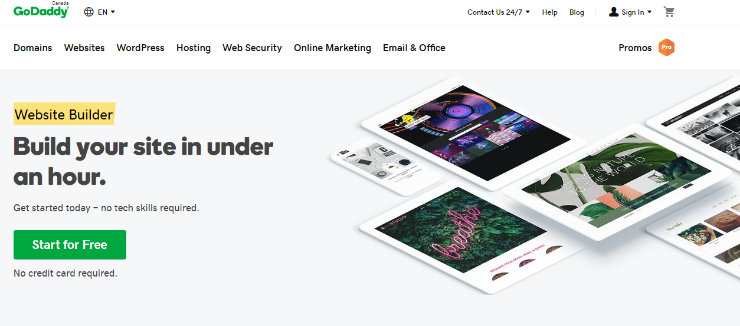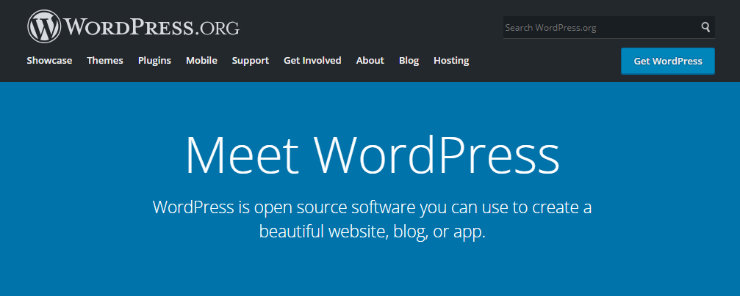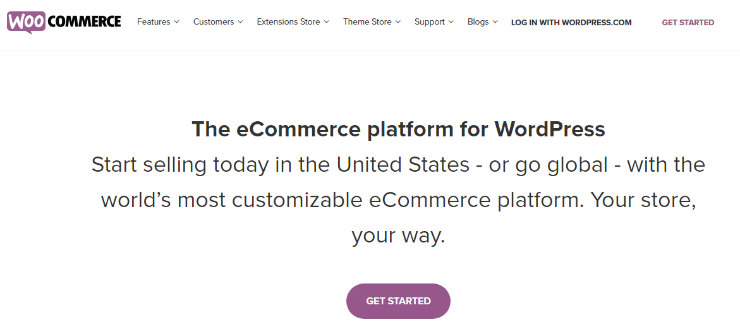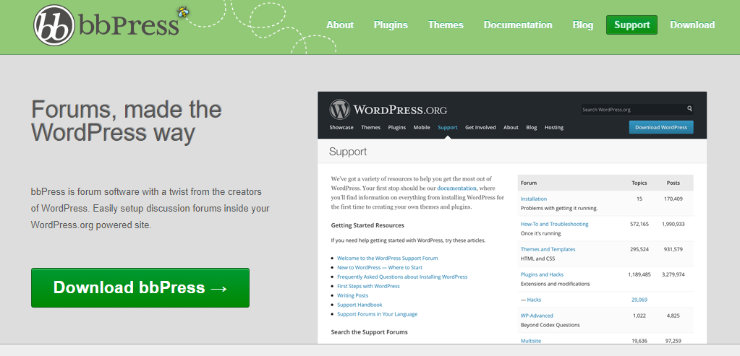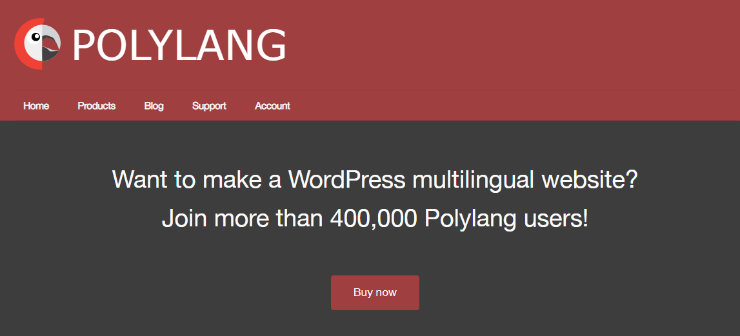[ad_1]
你想创建一个网站来打电话给你自己的?过去建立一个商业网站或个人网站过去非常具有挑战性,特别是如果你不是一个技术娴熟的人。好消息是,今天互联网上提供了所有不同的选项,即使对于非技术精明的用户来说,启动网站也变得非常容易。哈利路亚!
基本上,如果你知道如何阅读,用鼠标指向并点击,那么你可以在不到60分钟的时间内创建一个网站。
通过创建网站,您可以将您的覆盖范围扩大到更广泛的受众,并与全球志同道合的人建立联系。有了正确的策略,您的网站还可以帮助您建立稳定的在线收入流。
在本文中,我们将向您展示如何在没有所需技术知识的情况下逐步启动网站。
为方便起见,我们组织了最终指南,将网站分为10个不同的章节:
第1章:为什么要启动网站?

每天都有成千上万的网站被创建,你可能会想,为什么要建立一个网站?那里已经有很多,你怎么竞争?但是,重要的是要记住,即使您的网站不是最受欢迎的网站,它仍然可以为您带来很大的好处。
创建自己的网站的一些好处包括:
- 与新人联系 – 您自己的网站可以帮助您与来自世界各地的其他志同道合的人联系。
- 分享你的激情 – 如果你对某些事情充满热情,你可以创建一个网站,与他人分享这种激情。
- 帮助他人 – 想分享您的专业知识以帮助他人吗?一个网站可以帮助你做到这一点。
- 找到一份新工作 – 许多雇主都在网上寻找候选人。个人专业网站可以展示您以前的工作并帮助您找到新工作。
- 赚取额外的钱 – 通过广告,联盟营销或在线销售产品,您可以建立一个网站,让自己一些额外的钱。
- 推广您的业务 – 如果您有现有业务,您可以创建一个网站来推广您的业务并吸引新客户上网。
此外,如今,创建网站非常简单。因此,没有什么能阻止您创建自己的网站,无论是商业用途还是娱乐用途。
第2章:网站类型
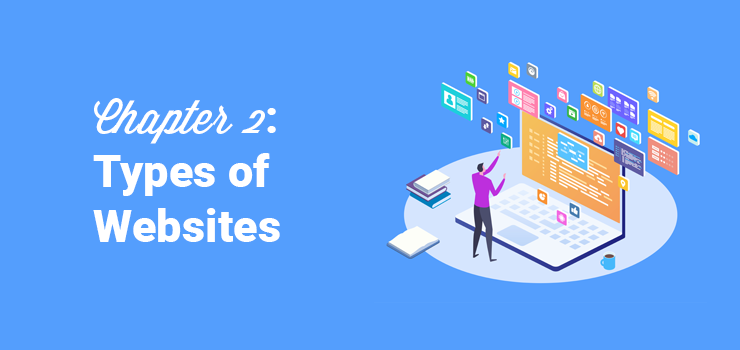
在制作网站之前,您需要确定应该制作什么类型的网站。您想要制作的网站类型是了解网站外观和网站需求的重要一步。
有许多不同类型的网站。我们将在下面介绍其中的一些内容,以帮助您确定要制作的网站类型。
网上商城
在线商店(也称为电子商务网站)是人们可以直接从您的网站购买产品的地方。您之前可能曾访问过多个电子商务网站,大多数大品牌都有这样的网站 沃尔玛(Walmart), 亚马逊, 百思买, 等等。

您可以访问这些网站,在线购买产品并将其发送给您。但网上商店不仅适用于大品牌,小型公司也可以拥有它们。
在电子商务网站上,您需要列出您要销售的产品,其中包括图片,产品说明和价格。您还需要一个购物车和结帐页面,访问者可以在其中输入付款信息进行购买。
因此,如果您计划在您的网站上销售产品,您将需要创建一个在线商店。
博客
博客是一个信息网站,定期更新的帖子/文章以非正式的会话风格编写,并按时间倒序排列(最新的博客文章)。当博客第一次被介绍时,人们主要将它们用作一种在线日记,在那里他们将分享他们早餐吃的东西,他们当天做了什么,分享他们的想法等等。
但今天,博客远不止于此。博客不仅仅是为了好玩,您实际上可以通过添加广告和联盟链接从博客赚钱。此外,人们可以访问博客网站,不仅可以阅读某人的生活,还可以了解各种主题。一些流行的博客壁龛包括:
- 生活方式
- 技术
- 创业
- 食品/食谱
- 育儿
- 健康与健身
- 旅行
- 财务/预算
博客的一些流行的例子包括我们自己的,IsItWP,以及 WPBeginner, 捏百胜, TechCrunch的,和 赫芬顿邮报。
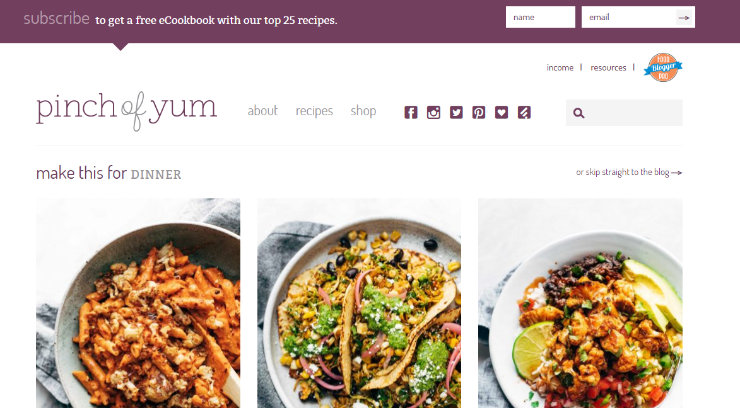
如果您想分享您对特定主题的知识,您应该选择创建一个博客网站。
有关更多详细信息,请查看我们的帖子 什么是博客 以及博客和网站之间的差异。
论坛
论坛网站是一个在线讨论网站,人们可以通过发布消息的形式进行对话。这与实时聊天网站不同,因为论坛几乎从不在线,网站上的任何人都可以随时阅读这些消息。
一个论坛网站,也称为留言板,是志同道合的人聚在一起讨论各种主题的机会。论坛通常被组织和安排到不同的主题,以便用户可以轻松找到他们正在寻找的东西。
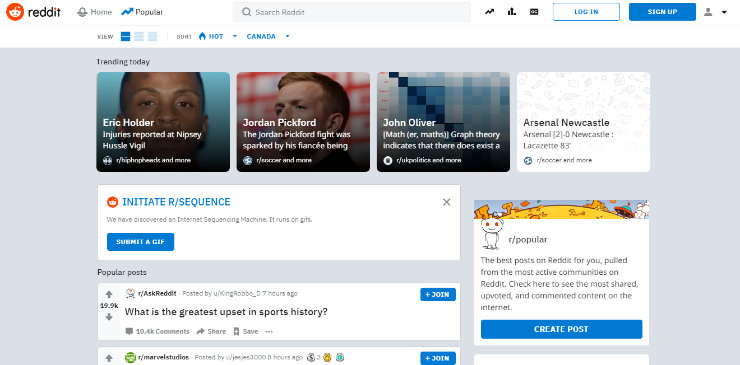
如果要为用户创建在线社区以讨论主题或各种主题,请考虑创建论坛网站。
利基社交网络
我们都听说过像Facebook和Twitter这样的社交网站,这些网站拥有数十亿用户。但是,利基社交网站仅针对一般人群的特定部分。
在利基社交网络上,用户可以与他们自己相似或对相同主题感兴趣的其他人建立联系。例如,您可以为狗主人或专业音乐家创建一个利基社交网络。
一些流行的利基社交网络包括 同学们, Last.fm,和 聚会。
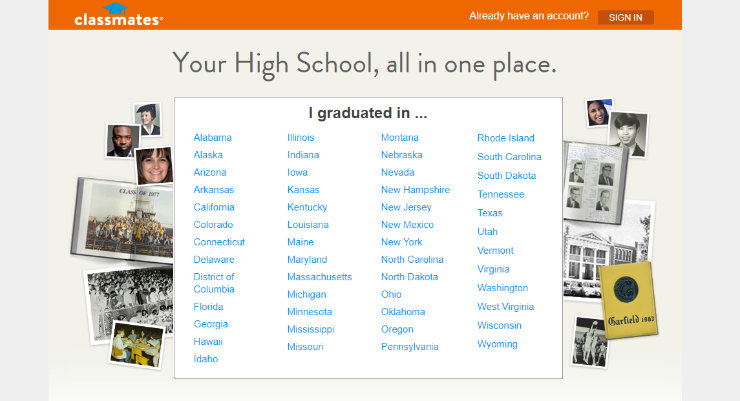
想要创建一个让志同道合的人能够相互联系的紧密社区?开始一个利基社交网站。
会员网站
会员网站是一个封闭式网站,只有订阅的人才能访问大门后面的内容。 “门”只是您放在网站前面的障碍,用户必须登录才能访问您的独家内容,特别优惠或与社区互动。会员网站可以是免费的,也可以是两者兼而有之。
您可以使用WordPress插件轻松地将任何网站变成会员网站 MemberPress。
一些受欢迎的会员网站包括 愿望清单内幕, 安静的猜测,和 由CopyBlogger授权。
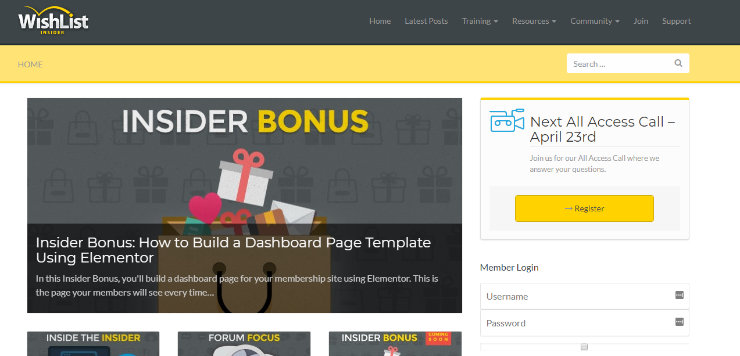
如果您想创建具有VIP感觉的网站,请考虑创建会员网站。
静态商业网站
另一种流行的网站是静态商业网站。静态业务站点是一个不变的,很少更新的网站,代表和促进特定的业务。这种类型的网站存在,以便人们可以在线发现您的业务并预览您提供的内容。
静态商家网站可能包含您的商家地址,电话号码,联系页面以及您的商家业务概况。它们通常还包括“关于”页面,以便您的潜在客户可以了解您和您的凭据,您提供的服务列表,商家照片以及评论或推荐。
静态商业站点的一些示例包括 令人敬畏的动机 和小型企业网站一样 新的生态景观。
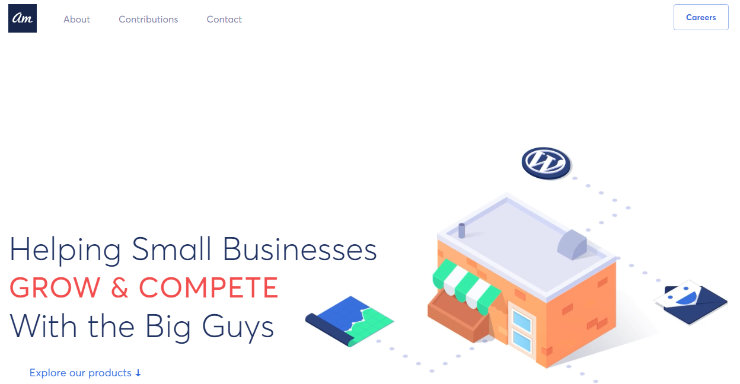
因此,如果您想为您的小型企业创建在线展示,并且没有可在线销售的产品,请选择静态企业网站。
希望你现在已经决定了你应该制作什么类型的网站。下一步是开始构建它!但首先,您必须选择正确的网站构建器。
第3章:选择网站构建器
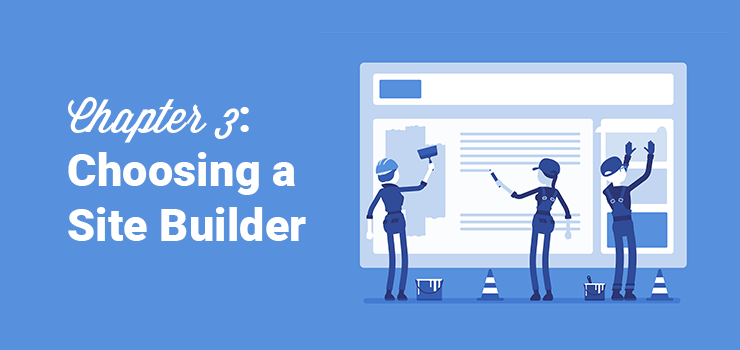
建立一个曾经很困难的网站。如果你想要自己的网站,你必须从头开始构建它,这需要专家级的编码技能。或者您必须雇用一名网页设计师为您构建它,这可能相当昂贵。幸运的是,情况已经不是这样了。
市场上有许多网站建设者可以让您轻松地立即建立网站。但并非所有网站构建者都是平等创建的。有这么多人可供选择,您如何知道哪个网站建设者最适合您?
在下一节中,我们将介绍一些 最好的网站建设者。我们将讨论它们的功能,易用性,价格等,以帮助您确定哪个网站构建器是构建您的网站的最佳选择。
3.1。最佳网站建设者摊牌
以下网站建设者都是初学者友好的,这意味着有了这些选项,你可以在几个小时内建立一个网站。我们将逐一介绍,以帮助您确定最适合您需求的网站构建器。
Wix是拖放网站构建器,允许您轻松创建任何类型的网站。您可以从空白平板开始设计自己的网站,或者您可以从500多个设计师制作的模板中进行选择,这些模板可以让您的网站立即获得专业的外观。您还可以轻松添加视频背景,动画等。
优点:
- 免费 – 你可以开始使用 维克斯 免费。他们的免费计划允许您创建一个功能有限的简单拖放网站。
- 响应式设计 – 您使用Wix创建的任何网站都将针对移动设备,平板电脑和台式机进行优化。这意味着无论您的网站访问者使用什么设备,您的网站都会相应地进行调整。
- 高级功能 – 使用Wix,您可以轻松集成高级功能,例如添加电子商务店面。 Wix还提供搜索引擎优化工具和指南,以帮助优化您的网站有机流量。
缺点:
- Wix-Branded Ads – Wix使用免费套餐在您的网站上显示品牌广告,您需要升级到高级计划以删除广告。
- 有限的定制 – Wix限制定制。您必须升级到高级计划才能访问更多功能,即使这样,与其他网站构建者相比,它仍然有限。例如,如果您想在您的网站上接受在线支付,则需要升级到每月20美元的商业计划。
- No Export – Wix无法导出您的网站数据。因此,如果您希望将来将您的网站迁移到另一个平台,那么就没有简单的方法可以做到这一点。
价钱:
您可以使用Wix免费构建一个简单的网站。但要获得更强大的功能并删除Wix品牌的广告,您必须升级到付费网站计划。这些计划从每月5美元到每月29美元不等。正如我们前面提到的,如果你想用Wix创建一个电子商务网站,你需要升级到商业和电子商务计划,每月20美元 – 每月35美元。
GoDaddy是一家知名的域名注册商和托管服务提供商,但他们也提供了一个简单的拖放网站构建器。他们提供了许多网站构建模板,以帮助您入门。此外,这些模板可以使用混合和匹配部分轻松定制。
优点:
- 营销工具 – GoDaddy网站建设者提供了许多营销工具,包括搜索引擎优化和电子邮件营销,以提高您的在线形象。
- 网站类型选项 – 此网站构建器允许您创建许多不同的网站类型。您可以轻松地将博客或电子商务店面添加到您的网站。
- 适合移动设备 – 在GoDaddy Website Builder上创建的所有网站都适合移动设备。
缺点:
- 有限的自定义 – 与其他选项相比,此网站构建器为您的网站提供的设计选项更少,功能更少。
价钱:
此网站建设者不提供免费计划。你可以开始使用 GoDaddy网站建设者 只需5.99美元/月的个人计划。如果您想在您的网站上接受在线支付或使用PayPal捐款,您需要以每月9.99美元的价格升级到商业计划。
想与GoDaddy Website Builder建立电子商务网站?然后你需要选择最昂贵的计划,在线商店,每月花费29.99美元。
Shopify是一个面向电子商务网站的热门网站建设者。这个基于Web的网站构建器使您可以立即创建在线商店,而无需处理任何代码。它们提供大量免费和付费,可定制的主题,让您的在线商店瞬间获得专业外观。
优点:
- 在线支付 – 您可以在没有任何第三方帐户的情况下接受Shopify的付款。此外,它们还与100多个第三方支付网关无缝集成。
- 高级营销工具 – Shopify提供高级营销工具,如SEO工具和内置博客。此外,它们还提供营销仪表板报告,以便您可以关注在线商店的性能。
- 移动友好 – 无论用户在哪个设备上查看您的网站,您的在线商店都会看起来很棒。
缺点:
- 交易费用 – 如果您使用外部支付网关,您将需要支付高额的交易费,从0.5%到2%不等。
- 昂贵的应用程序 – 社交媒体集成,实时聊天,闪存销售等应用程序必须单独购买。这可以使您的在线商店定制非常昂贵。
价钱:
你可以开始使用 Shopify 基本计划每月29美元,包括3%的交易费。您可以升级到第二高的计划,每月79美元,将交易费用降低到1%。如果您希望将交易费用降低到0.5%并获得运行在线商店所需的所有高级功能,则需要升级到最昂贵的计划,每月费用为299美元。
Squarespace是另一个受欢迎的网站建设者,它提供了构建个人或商业网站所需的一切。他们提供一系列令人惊叹的模板,专为各种行业和利基设计,可在一秒钟内改造您的网站。此外,每个模板都带有许多可自定义的功能。
优点:
- 带宽和存储 – 通过他们的任何计划,您可以获得无限的带宽和无限的存储空间。
- 无交易费用 – 您不会通过电子商务基本或高级计划获得电子商务交易的收费交易费用。
缺点:
- 没有免费计划 – 与其他网站建设者不同,Squarespace不提供任何免费计划。此外,他们的起始计划也比其他网站建设者更昂贵。
- 没有第三方应用 – Squarespace不允许任何第三方应用或扩展。
价钱:
个人计划 Squarespace 每月12美元,这包括建立无限页面的能力。如果您想在您的网站上添加电子商务店面,您需要升级到他们的商业计划,每月花费18美元,交易费用为3%。如果您想要删除交易费用,您需要以每月26美元的价格升级到他们的基本在线商店计划。
WordPress.org是有史以来最受欢迎的网站建设者,它实际上超过了网络上所有网站的30%。使用WordPress(也称为自托管WordPress),您可以轻松构建任何类型的网站,包括博客,小型企业或企业商务网站,电子商务商店,产品组合等。
优点:
- 无尽的自定义 – 使用WordPress,您可以访问数以千计的免费和付费主题,从而改变您网站的外观。此外,您可以随时轻松更改主题。您还可以访问数千个免费和付费插件,以自定义并为您的网站添加额外的电量。使用WordPress可以轻松且经济地创建完全自定义的网站。
- 控制 – 当您使用WordPress时,您可以完全控制您的网站。
缺点:
- 轻微学习曲线 – 学习如何使用WordPress需要一点时间。但是,有一些插件可以用来使这个过程更容易 拖放页面构建器。
- 无法创建免费网站 – 您无法使用WordPress.org创建免费网站,您需要支付托管和域名费用。
价钱:
虽然WordPress软件是免费使用的,但您仍然需要花一些钱来建立一个网站。您需要购买域名和网络托管,但不要担心,根据您选择的提供商,这些可能非常实惠。另外,我们将在本指南中详细介绍如何购买域名和虚拟主机。
3.2。我们为什么推荐WordPress.org?
WordPress的 是迄今为止建立网站的最佳选择。出于某种原因,它是最受欢迎的网站建设者。您可以使用WordPress构建您想要的任何类型的网站,无论是商业网站,博客,会员网站,论坛网站,电子商务网站等。此外,使用WordPress,您可以即时访问使您的网站成功所需的任何功能。
让我们快速了解WordPress.org是最好的网站建设者的原因:
- 免费 – WordPress是免费使用。您需要购买域名和网络托管,但即使有这些费用,WordPress仍然是最实惠的网站建设者之一。
- 热门 – WordPress是迄今为止在线所有网站的30%以上,是迄今为止最常用的网站建设者。数字安全。
- 社区 – 在线有一个庞大的WordPress社区。无论何时遇到问题或需要回答问题,您都可以在线找到大量文章,教程和讨论,以帮助您解决问题。
- 主题和插件 – 对于其他网站构建者,您需要支付额外费用才能访问为您的网站添加更多功能和自定义的插件。但是使用WordPress,您可以立即访问数千个免费插件。不仅如此,他们还提供了数以千计的免费主题。
- 易于使用 – 虽然WordPress需要一些习惯,但它实际上非常简单易用。安装WordPress本身也没有时间,许多托管服务提供商提供一键式WordPress安装。
因此,总的来说,我们建议使用WordPress来构建您的网站。即使是完整的初学者也可以立即使用WordPress制作完全定制的网站。
不要让WordPress.com与WordPress.com混淆。我们建议您使用WordPress.org构建您的网站,因为您可以完全控制您的网站,无限制的自定义选项,而且它也更便宜。有关更多详细信息,请查看我们的文章比较 WordPress.com与WordPress.org。
第4章:使用WordPress设置您的网站 – 技术指南
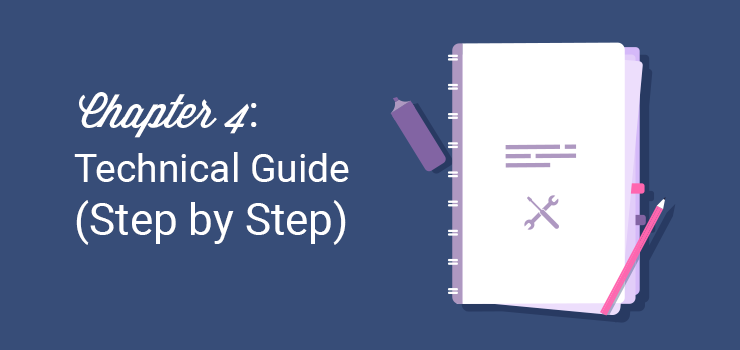
WordPress是互联网上最受欢迎的网站建设者平台。它占据了今天所有网站的30%以上。
WordPress使从头开始构建网站变得异常简单。您可以通过分别安装正确的主题和插件(应用程序)轻松自定义网站的外观和功能。
最好的部分是,您不需要知道任何代码或技术娴熟。我们将帮助您在不到一个小时的时间内启动并运行您的WordPress网站。您所要做的就是按照下面的分步指南。
4.1。选择一个平台 – 自托管WordPress
因为有很多不同的网站建设者可供选择,所以很容易被淹没。即使许多网站构建者可以免费使用,我们也总是建议在自托管的WordPress平台上创建一个网站。

使用免费的网站构建器,您无法设置自定义域名。例如,您将无法获得以下自定义域:
www.mycoolwebsite.com
相反,你会被困在这样的事情:
www.freewebsitebuilder.com/mycoolwebsite.com。
这不是那么专业,而且访问者更难以记住。免费网站构建器还会显示不相关的广告,这会使您的网站看起来不专业,并可能会惹恼您的访问者。如果您想设置自定义域名并删除其广告,那么几乎每个网站构建商都要求您订阅非常昂贵的高级计划。
另一个缺点是大多数网站建设者的界面都捆绑了许多你可能永远不需要的臃肿选项。这使得创建网站对于新手用户来说是一项繁琐的任务。
另一方面,自托管的WordPress平台可让您完全控制您的网站。界面很整洁,只需安装所需的插件,即可轻松扩展站点功能。此外,WordPress提供数千个免费插件,这使您可以免费使您的网站更强大。
此外,您可以从官方主题存储库中找到数千个免费的WordPress主题,使您可以按照自己的方式轻松自定义网站的外观。
4.2。购买域名和托管帐户
要在自托管的WordPress.org上创建网站,您必须拥有一个域名和一个网络托管帐户。
域名:您的域名是您在互联网上的网站地址(URL),如Google.com或IsItWP.com。这是您的客户在浏览器中键入的内容,以访问您的网站。域名通常每年约14.99美元。
网站托管:您的网站托管帐户是您的网站内容和文件在线存储的地方。把它想象成你网站的实体房子。当访问者通过输入您的网址(域名)尝试访问您的网站时,他们将被定向到您在网络托管服务器中设置的网站。 虚拟主机 通常每月收费7.99美元。
域名和托管的综合成本可能非常昂贵,特别是如果您刚刚开始。
这就是我们与之达成协议的原因 BlueHost的 为我们的用户提供免费域名和超过60%的网络托管优惠。它是 好主意 开始。
Bluehost是世界上最大的托管公司之一。自2005年以来,他们一直在与WordPress社区合作,他们是WordPress自己的官方推荐的托管服务提供商。阅读我们的 Bluehost评论 欲获得更多信息。
注意:我们相信完全透明。如果您使用我们的推荐链接购买主机,那么我们将免费获得一笔小额佣金。您实际上可以获得托管+免费域名+免费SSL的折扣。我们可以从任何托管公司获得佣金,但我们推荐的产品我们真正相信会给我们的读者带来价值。
要启动您的WordPress网站,请访问 Bluehost的网站 然后单击立即开始按钮。
在下一页,您将被要求选择一个计划。由于您刚刚开始,您应该选择基本计划。它包括一个免费的域名和 免费的SSL证书。随着网站的增长,您随时可以升级。
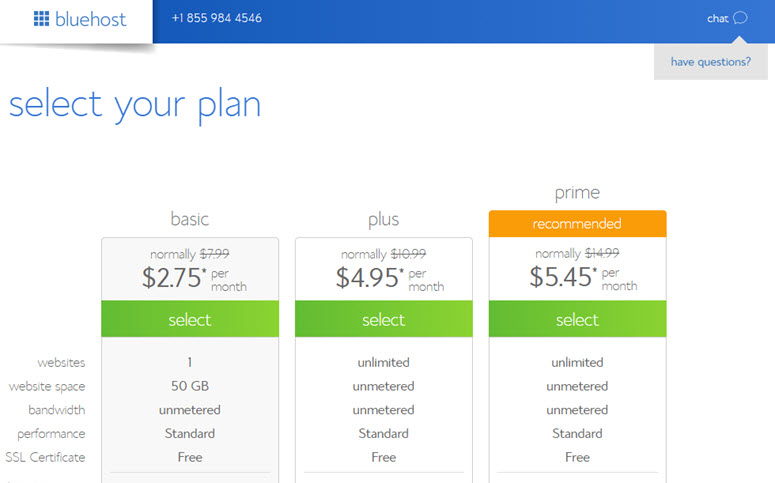
在下一个屏幕上,系统会要求您选择您拥有的现有域名,或者您可以免费购买新域名。由于它是免费的,请继续购买新的。
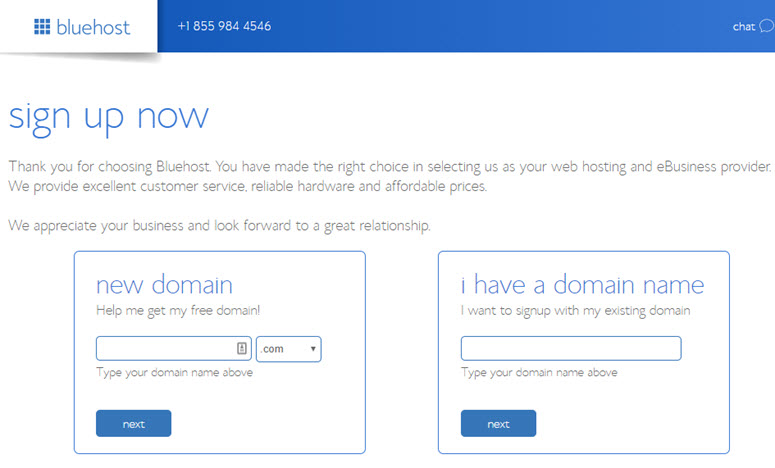
系统会提示您输入帐户信息。只需点击几下,即可轻松注册。
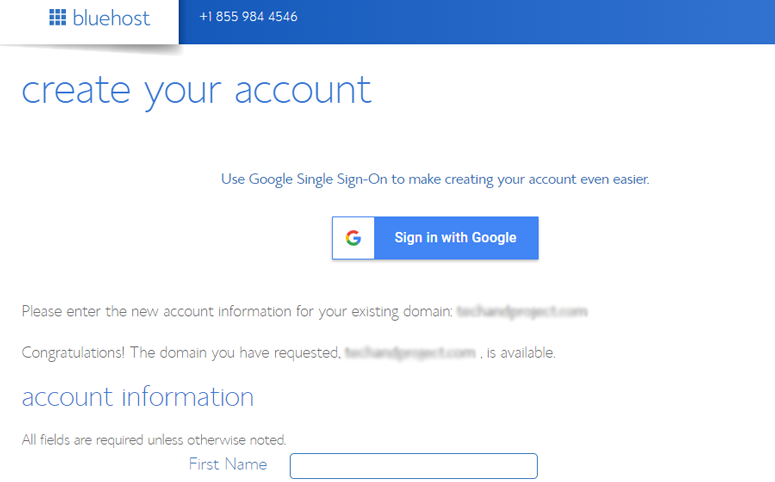
输入您的详细信息后,向下滚动页面,直到找到包裹信息框。您可以选择12个月,24个月或36个月的基本计划。您还可以看到预选了几个插件,累计总价格。我们建议取消选中插件,因为您不会立即需要这些插件。如果您的需求发生变化,您可以随时购买。
选择36个月的计划将为您带来最物超所值的服务。
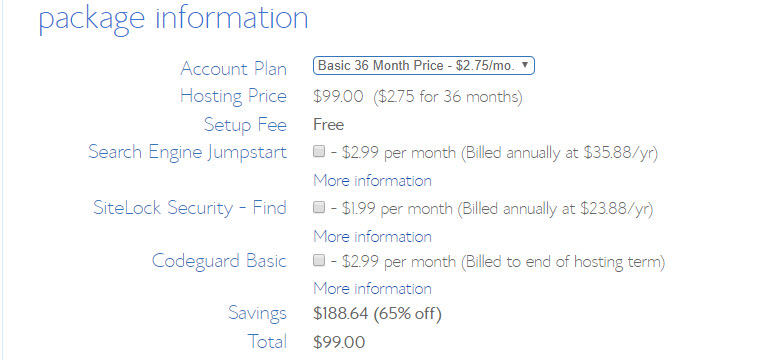
完成选择计划后,请进一步向下滚动页面以输入付款详细信息。您必须同意他们的服务条款,然后单击“提交”。
而已!
您已成功订阅托管计划。系统会要求您为帐户创建密码。
接下来,您将收到一封电子邮件,其中包含有关如何登录Web托管控制面板(cPanel)的详细信息,您可以在其中管理从托管文件到电子邮件和支持的所有内容。
4.3。在Web主机上安装WordPress
使用Bluehost,您不必经历单独的WordPress安装过程,因为Bluehost现在默认安装WordPress。你所要做的就是 选择你的WordPress主题,指定您网站的名称和标语,您就可以开始使用WordPress了。
订阅您的主机方案后,系统会提示您选择WordPress主题。您可以在此步骤中选择任何内容,因为您可以随时更改主题(我们将在本教程的后续步骤中向您展示如何执行此操作)。最重要的部分是开始构建您的网站,以便任何主题现在都可以完成。
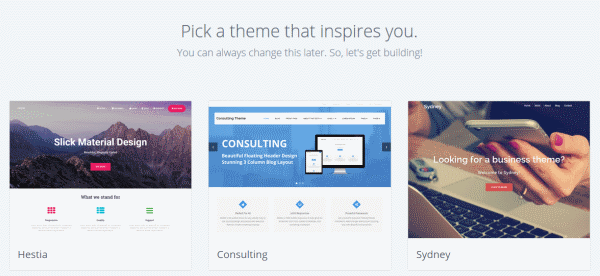
然后,系统会要求您选择网站的名称和标语。
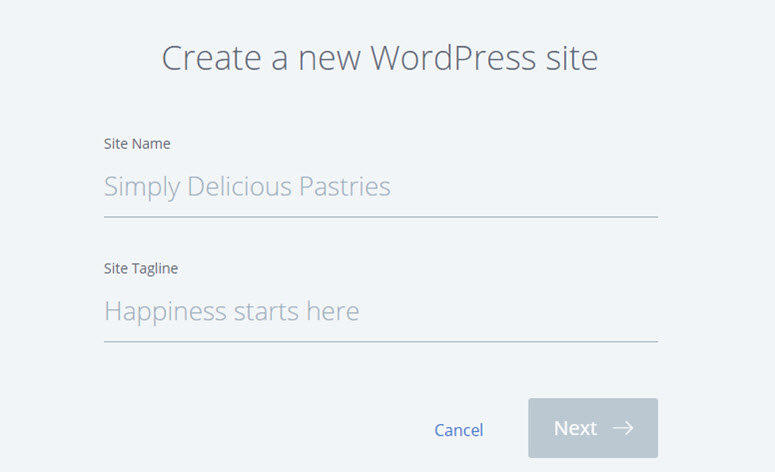
指定详细信息后,单击“下一步”。 Bluehost现在将为您安装WordPress,一旦完成,将显示如下屏幕:
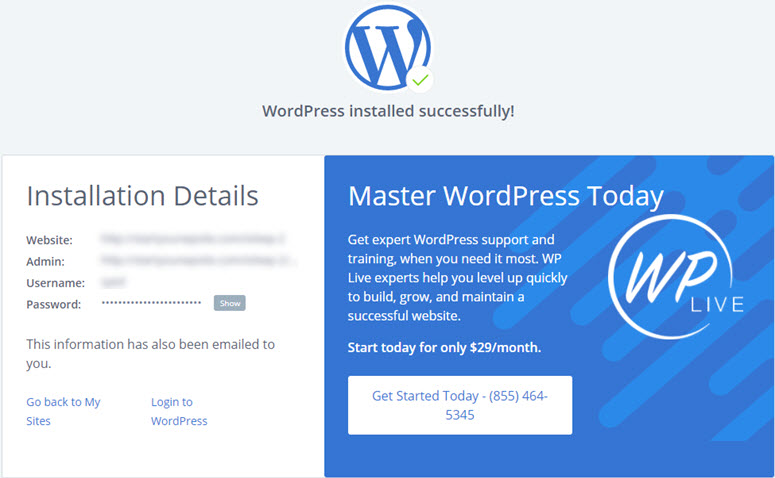
您可以通过将wp-admin附加到您的网址来登录您的网站。以下是您的WordPress登录URL应如下所示:
http://example.com/wp-admin
您现在可以使用发送到您的电子邮件地址的凭据登录您的WordPress网站。
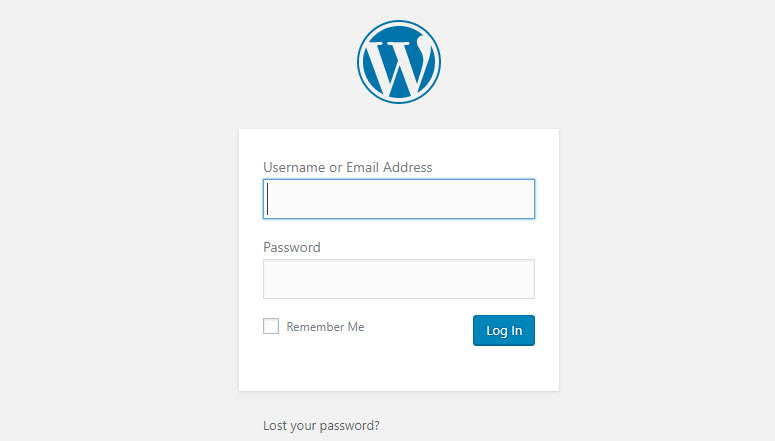
4.4。改变你的WordPress主题
使用WordPress,您可以轻松更改网站的视觉外观。您所要做的就是找到合适的WordPress主题并将其安装在您的WordPress网站上。
默认的WordPress主题很好,但如果您想为您的网站提供不同的外观,那么您可以从官方主题目录中找到另一个主题并将其安装在您的网站上。找到完美的主题将使您的网站真正属于您的网站,并赋予它个人“你”的感觉。
强烈建议您查看我们的 顶级WordPress主题列表 在潜入并安装随机主题之前。
如果您选择高级主题,则必须从主题供应商的网站下载并上传到您的WordPress。
如果您决定使用官方主题存储库中的免费WordPress主题,则可以直接从WordPress仪表板安装它,而无需从计算机上手动下载。
要安装免费主题,请导航到WordPress仪表板中的外观»主题。然后单击“添加新主题”框。
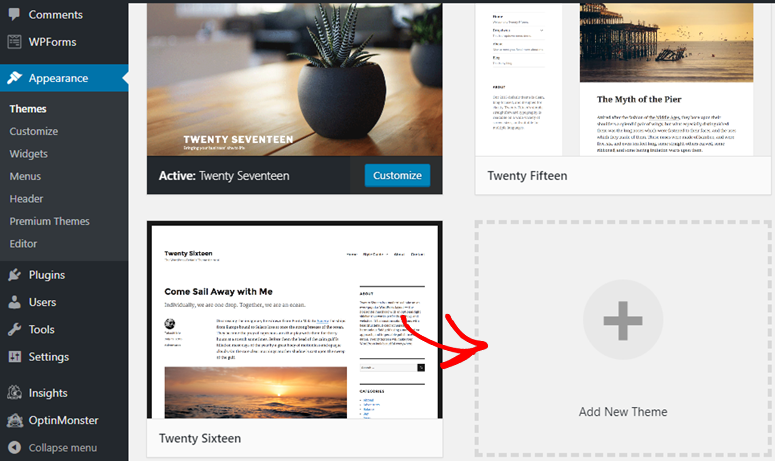
这将在仪表板中显示一些特色主题。在安装之前,您甚至可以通过单击图像查看预览及其详细信息。
您还可以通过单击“特征过滤器”按钮,根据布局,功能和网站利基过滤主题。
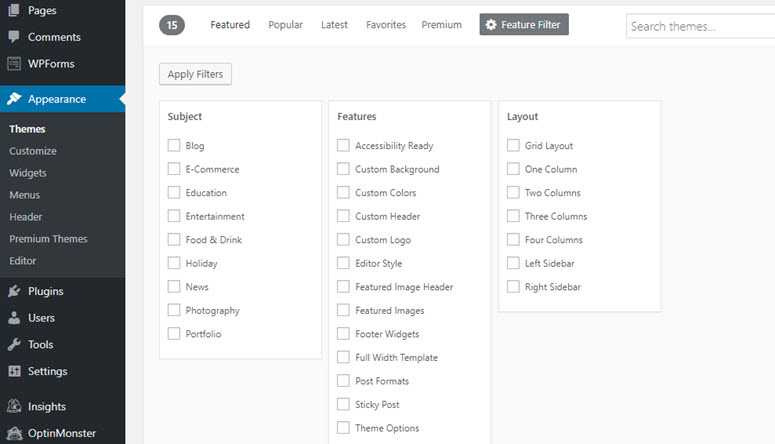
在右上角,在搜索栏中键入主题的名称。找到完美主题后,将鼠标悬停在其图像上,然后单击“安装”按钮。接下来,单击“激活”按钮以更改网站的外观。
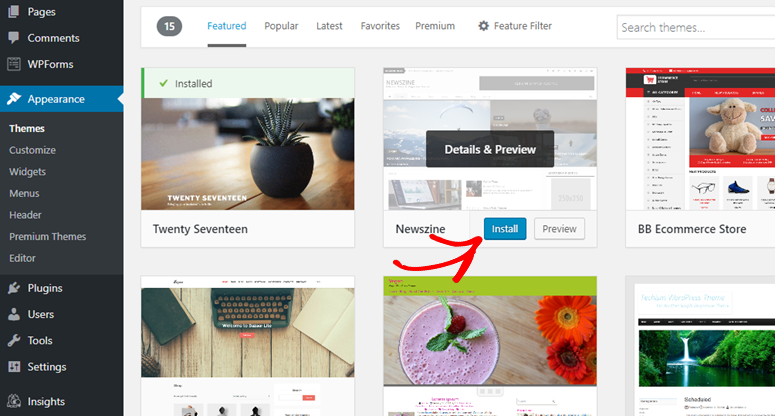
4.5。创建你的第一页
更改网站外观后,您可以在网站上创建新网页了。
在WordPress仪表板的左侧菜单中,您可以找到两个类似的选项,这些选项通常会让初学者感到困惑:帖子和页面。
如果要在WordPress网站中创建独立页面,请选择“页面”,例如“关于我们”页面,“联系”页面,“服务条款”页面等。
如果您要在WordPress网站上创建按反向时间顺序(较新的第一个)显示的博客文章,请选择帖子。帖子也分为类别和标签。你可以看看 类别和标签之间的差异 有关此内容的更多信息。
要创建第一页,请单击页面»添加新页面,转到页面编辑器。在开始在页面编辑器中编写内容之前,您需要为页面添加标题。要将图像上传到您的网站,您只需将图像从计算机拖放到文本编辑器即可。或者,您可以使用“添加媒体”按钮上传图像和视频。
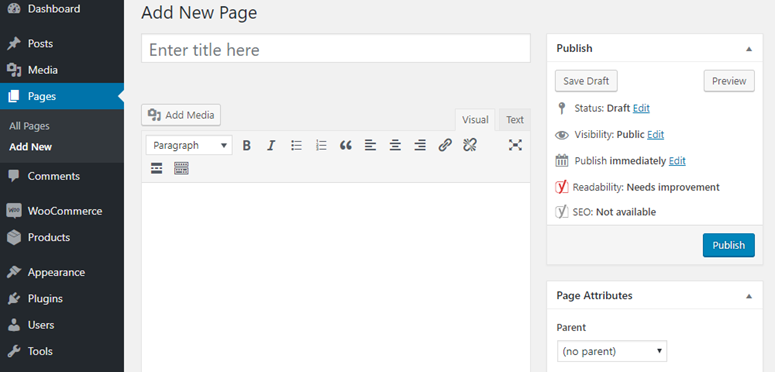
4.6。设置静态主页
默认情况下,WordPress会将您博客的最新帖子显示为主页而不是静态页面。如果您想将自定义页面设置为主页,请按照以下步骤操作。
创建页面后,转到WordPress管理仪表板上的设置»阅读。在您的主页显示选项中,您需要选择静态页面,然后在下拉菜单中选择要显示为首页的页面。完成后,单击“保存更改”按钮。
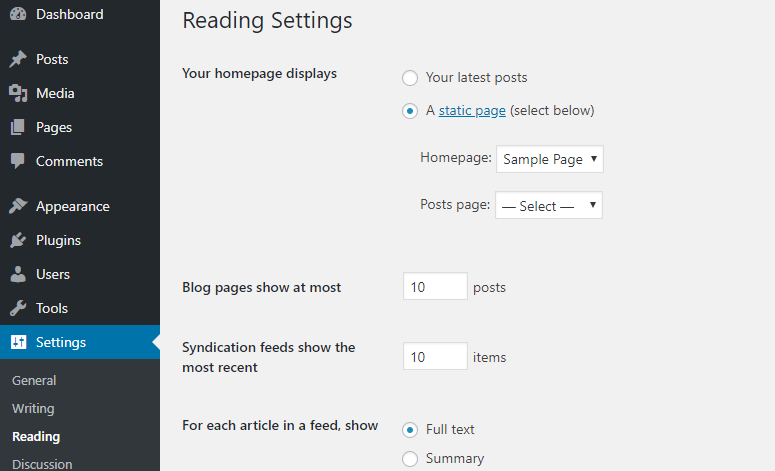
4.7。添加导航菜单
您的导航菜单会粘贴到您网站的顶部,以便您的访问者可以轻松找到最重要的网页和链接,从而轻松浏览您的网站。
要添加导航菜单,您需要转到WordPress管理员中的外观»菜单。在“菜单名称”字段中指定菜单名称(如果您的主题支持多个导航菜单,则会特别方便)。然后,单击“创建菜单”。
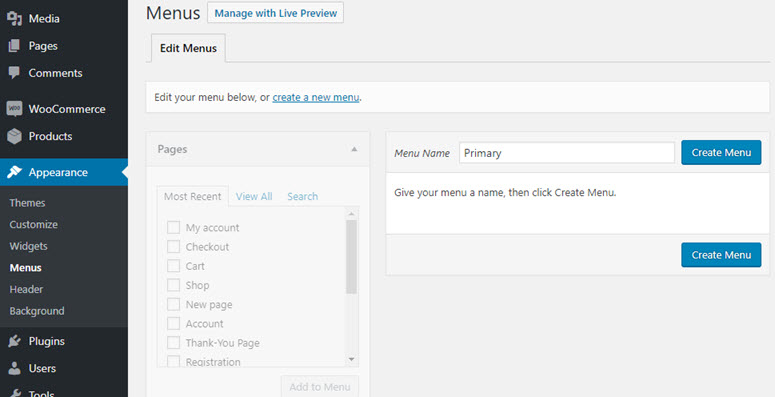
您现在可以从现有页面,帖子,自定义链接和类别中进行选择。选择您认为值得推荐的内容后,单击“添加到菜单”。通过拖放,您可以定位菜单的结构。然后,您需要指定显示位置,然后单击“保存菜单”。
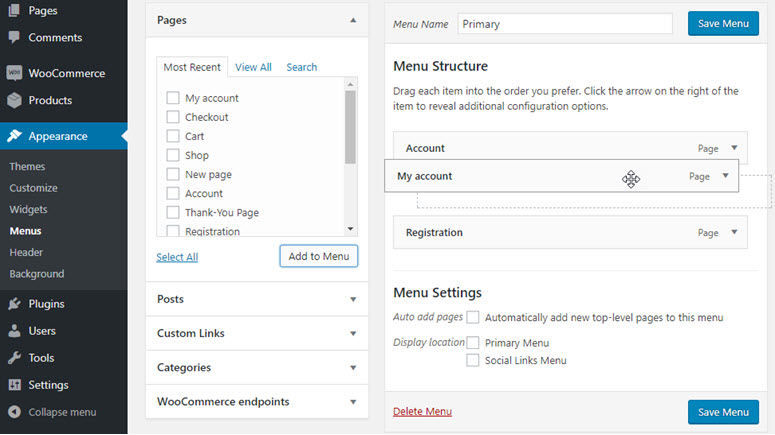
4.8。添加和自定义您的小部件
在您的WordPress网站上,您可以轻松地在侧边栏和其他小部件就绪位置添加小部件,例如您的网站页脚,标题等。
添加小部件允许您添加自定义/动态内容。它允许您在网站的侧边栏或页脚区域添加菜单,日历,联系表单,图库和其他漂亮项目等内容。
您可以通过转到外观»窗口小部件来添加窗口小部件,然后从可用的窗口小部件中进行选择。您只需将首选功能拖放到WordPress网站的小部件区域即可。
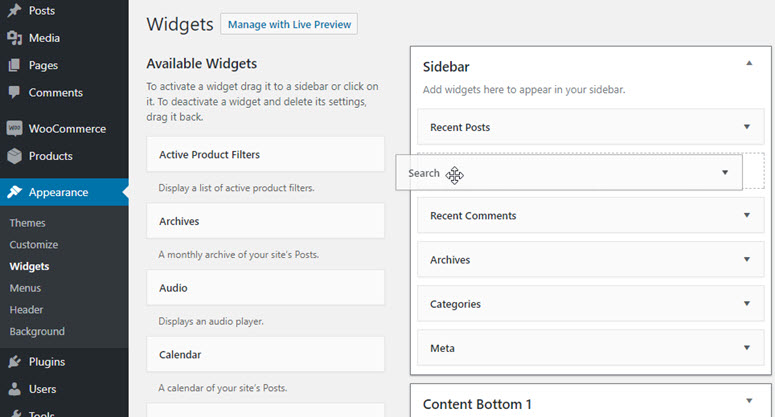
4.9。使用插件自定义WordPress
WordPress的魅力在于,只需安装正确的插件,即可轻松增强网站的功能。将插件视为您网站的应用程序(即 联系表, 画廊等)。
就像WordPress主题一样,您可以轻松地从WordPress仪表板中的WordPress插件存储库中找到并安装免费插件。
您所要做的就是访问插件»添加新的。使用右侧的搜索框查找插件,然后单击“立即安装”按钮。安装完成后,单击“激活”按钮使其正常工作。
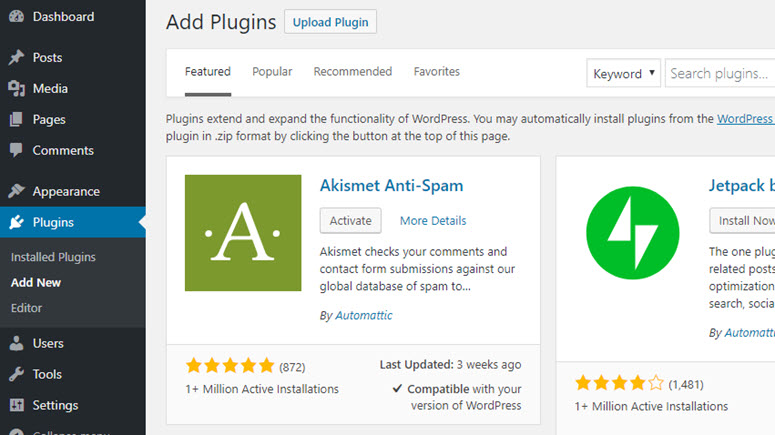
« Previous: Chapter 3 – Choosing a Website Builder
Chapter 5: Configuring Your Website Settings
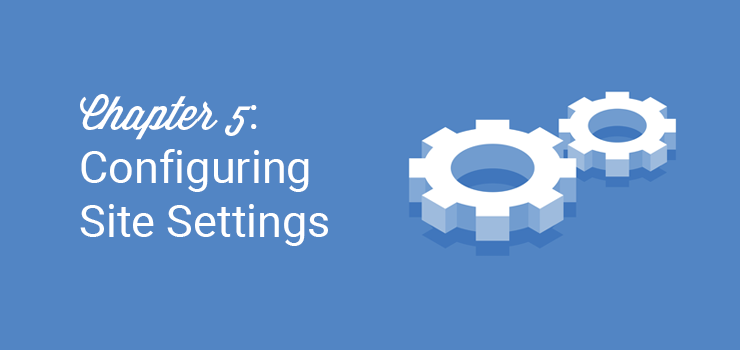
Next, you’ll want to configure your website settings. Configuring the basic WordPress settings is important to how your site functions. There are a few key website settings you should focus on, we’ll go over those below.
5.1。 Make Your Site Visible to Google
First, you need to make sure your website is visible to Google. This allows your website to be ranked in search engine results, which will allow users to find you on the web easier.
In the WordPress dashboard, go to Settings, then to the Reading section. In the Search Engine Visibility section, make sure the box is unchecked.
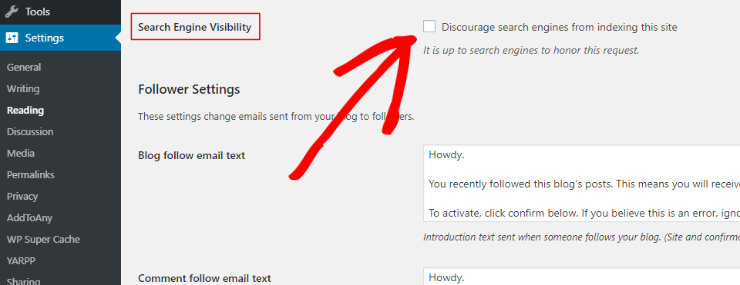
5.2。 Set the Permalink Structure
Next, you’ll want to set the permalink structure. A permalink is the web address used to link to your content. By default, WordPress sets the permalink structure, but it’s not the most optimized. Instead, you’ll want a permalink structure that will help search engines and your website visitors easily understand your content.
So, go to Settings, then to Permalinks. Under Common Settings, select the Post name option.
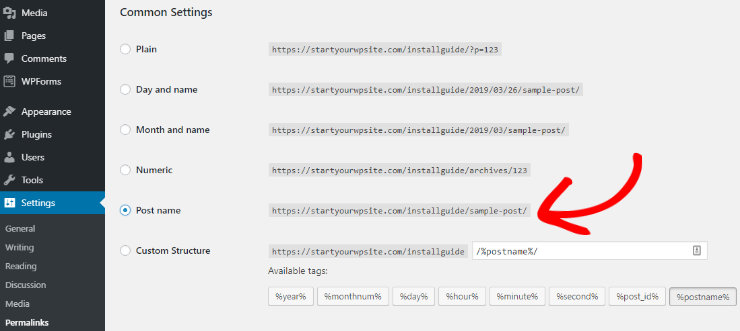
5.3。 Comments and Notifications
If you’re starting a blog or blogging on your website, you’ll also want to configure the comment settings for your website.
Any blog should allow users to comment on posts, this increases engagement on your website, boosts the time users spend on the page, and encourages to visit your website again.
To configure the comments, go to Settings, then Discussion. Here you can choose whether you want to allow people to comment on new articles and allow link notifications from other blogs (pingbacks and trackbacks) on new articles.
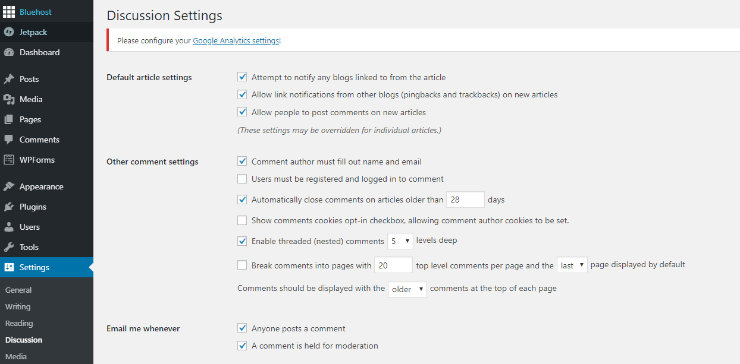
You can also decide whether you want commenters to have to fill out their name and email before commenting or be registered and logged in to comment. In addition, you can choose to receive an email notification anytime someone comments on your blog.
5.4. Update Your Timezone
You should also make sure your WordPress site is set to the correct timezone. Scheduled activities and plugins will go by the time your WordPress is set to.
So, if to make sure your WordPress website is set to your correct timezone, go to Settings and then to General.
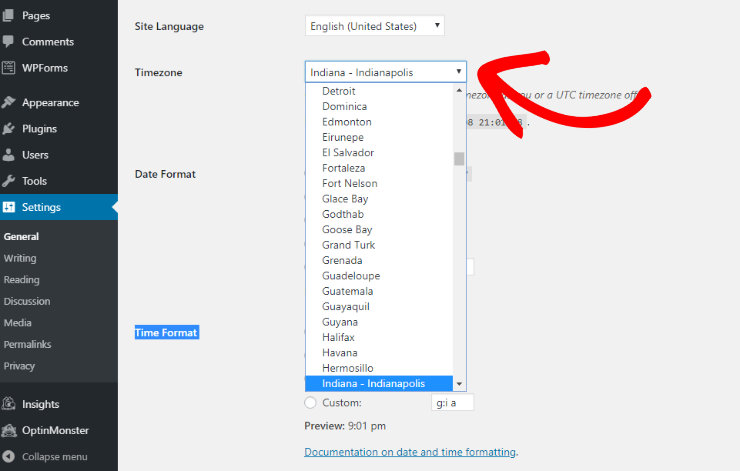
In the dropdown menu next the Timezone, choose a city in the same timezone as you or a UTC timezone offset.
↑ Go back to Table of Contents
« Previous: Chapter 4 – Creating a Website – Technical Guide (Step by Step)
Chapter 6: Essential WordPress Plugins & Tutorials (Basic)
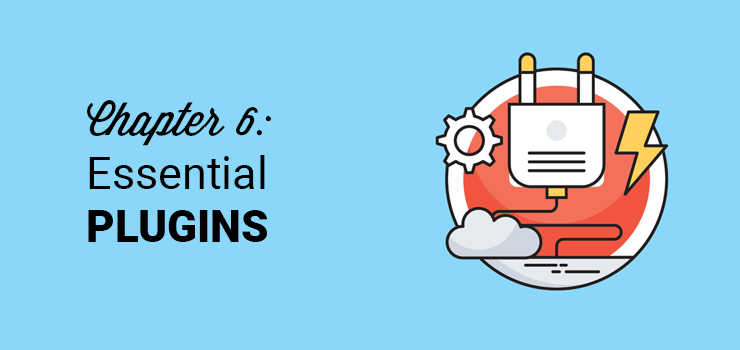
No matter what type of website you want to create, you’ll need to add the same essential features (such as the ability to create a contact form, ability to easily add SEO tags, and so on).
With WordPress, you can easily add those features without hiring a developer or writing a single line of code. All you have to do is to find the right plugin and install it on your site.
We’ll explain…
- How to add a contact form to your website
- How to track your visitors using Google Analytics
- How to improve your website’s SEO
6.1。 How to Add a Contact Form to Your Website
Regardless of your site’s niche, size, and purpose, adding a contact form is essential. When you have contact forms added, your visitors can easily reach out to you right from your website without having to log into their email account.
WPForms is the best contact form plugin for WordPress beginners. It lets you create contact forms with a drag and drop builder and allows you to publish the forms you create anywhere on your site with ease.
A few more benefits of using WPForms:
- Create any type of online forms hassle-free such as contact forms, donation forms, registration forms, signup forms, and more…
- All forms you create with WPForms will be 100% responsive, meaning they work on mobile, tablets, and desktop browsers.
- Seamlessly integrate your form with your favorite email marketing tools or third-party web apps.
- And more…
Read the complete WPForms review for more information.
To create a form on your blog, you’ll have to install WPForms by navigating to Plugins » Add New. Search for the WPForms plugin and, when it shows up, click Install Now, and then click Activate.
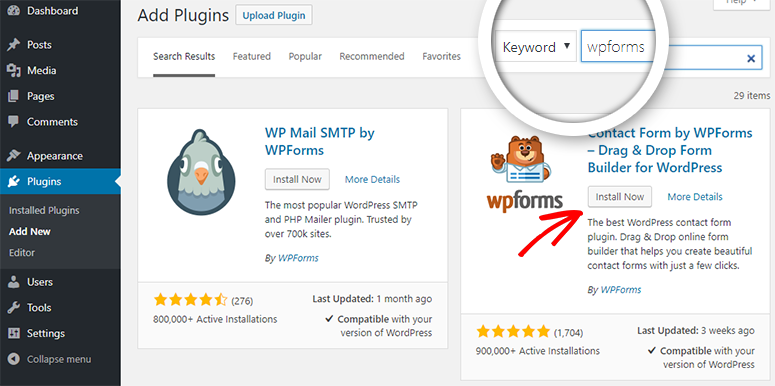
You’ll now be directed to the beautiful welcome page for WPForms. You can either click the Create Your First Form button or click WPForms » Add New to create your first form.
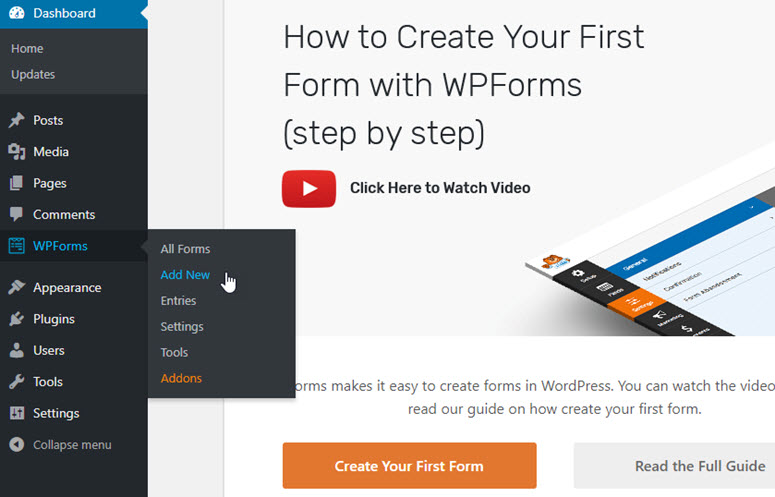
Next, you’ll be prompted to choose a template. You can select one of the premade templates or start with a blank form. If you want, you can give a custom name to your first contact form.
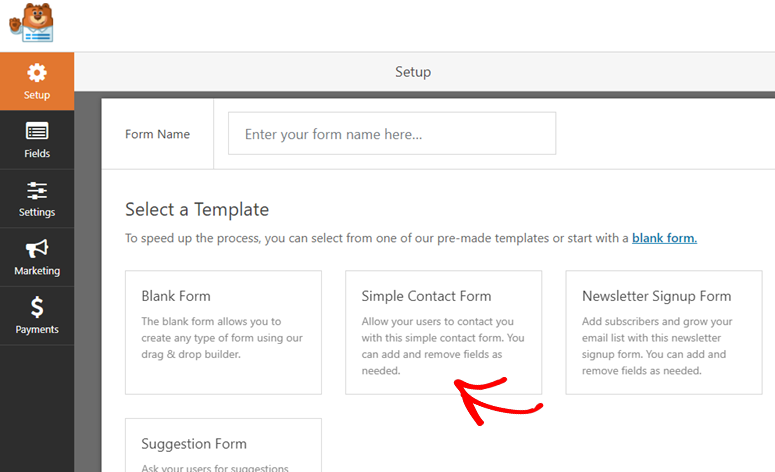
WPForms makes it easy to build a form with drag and drop. Click on the appropriate form fields in the left-hand panel to add them to your form. You can also re-arrange them or even remove any unnecessary fields with ease. After making the necessary changes click Save.
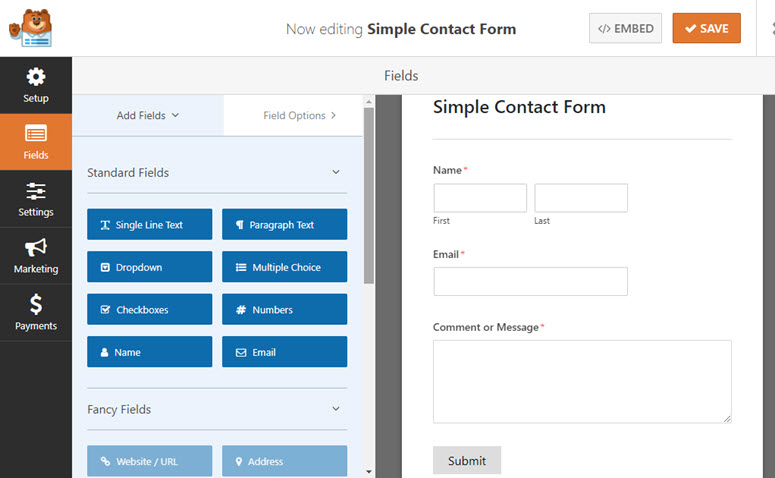
Go to your post or page editor and click the Add Form button above the text editor.
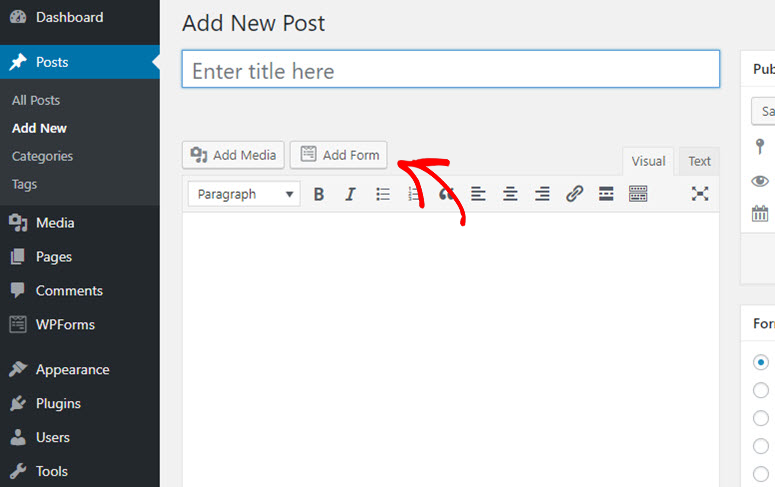
Select the correct form you want to publish, then click Add Form, and then click Publish.
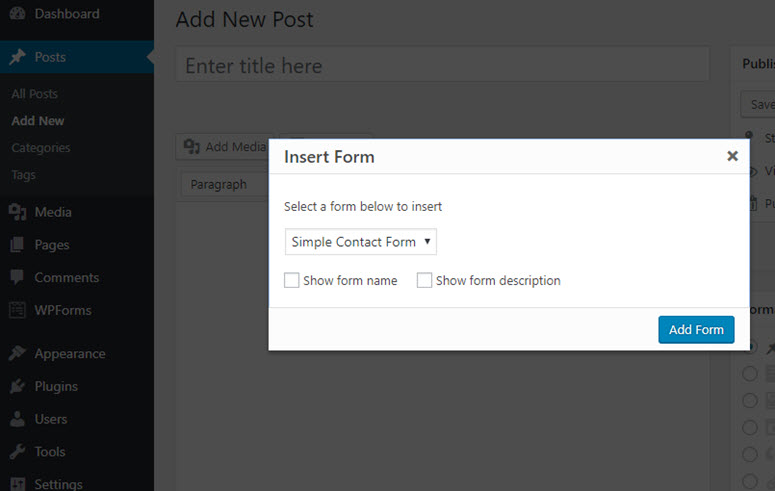
而已! You’ve now successfully published a contact form.
Want to create a contact form the easy way? Get started with WPForms today。
Want to start with the free version instead? Try WPForms Lite。
6.2。 How to Track Your Visitors Using Google Analytics
If you want to grow your website traffic, then you’ll first need to understand how people are finding your website and what they do when they get there.
The easiest way to track user interactions on your site is by using Google Analytics. Google Analytics is the best tracking solution for websites, and it’s completely free to use.
The MonsterInsights plugin makes it easy for you to setup Google Analytics on your WordPress website. Plus, it lets you make use of the full potential of Google Analytics tracking, like file downloads tracking, ads tracking, form submissions tracking, eCommerce transactions tracking, etc. without having to touch a single line of code.
Read the complete MonsterInsights review for more information.
To set up Google Analytics on your site, head over to Plugins » Add New. Search for MonsterInsights and, when the plugin shows up, click Install Now and then, activate.
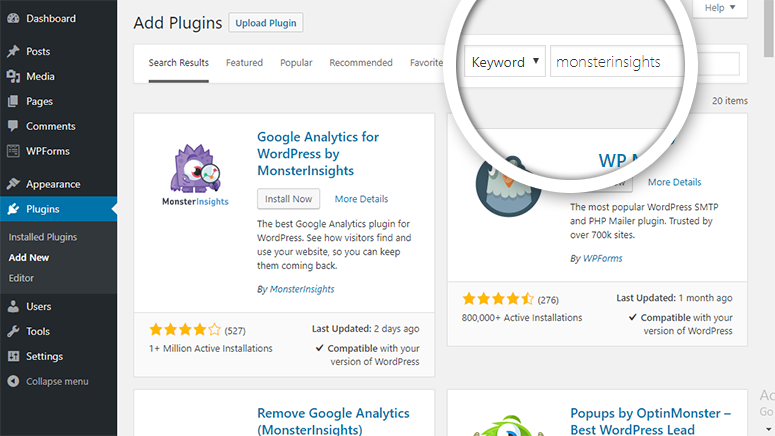
Head over to Insights » Settings to authenticate your site with Google Analytics. Click Authenticate with your Google account button.
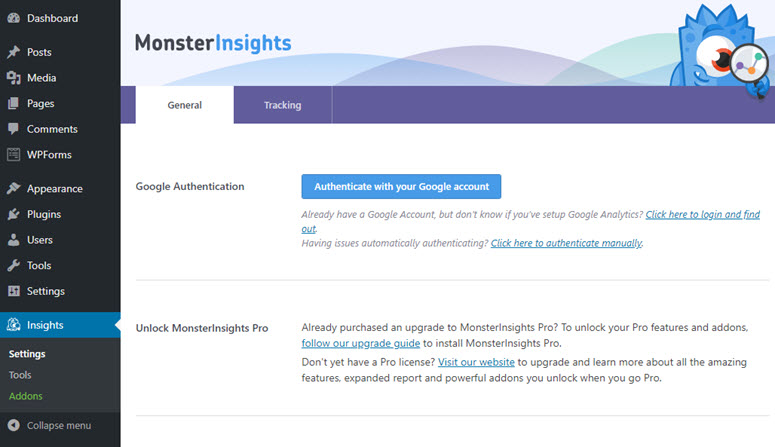
On the next screen, select your Google account.
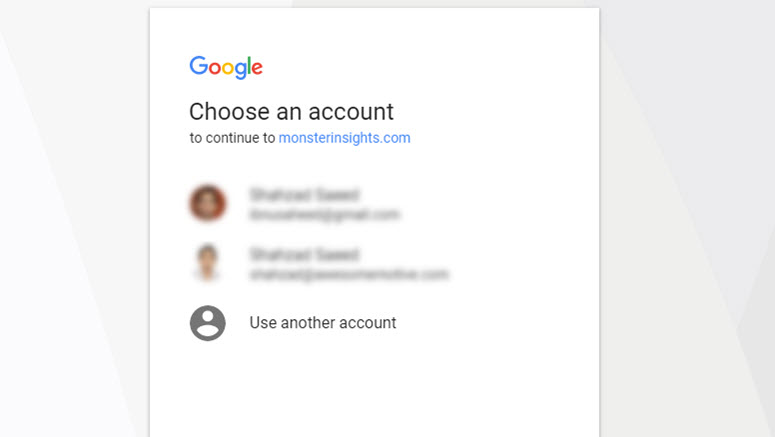
Next, allow MonsterInsights to manage your account.
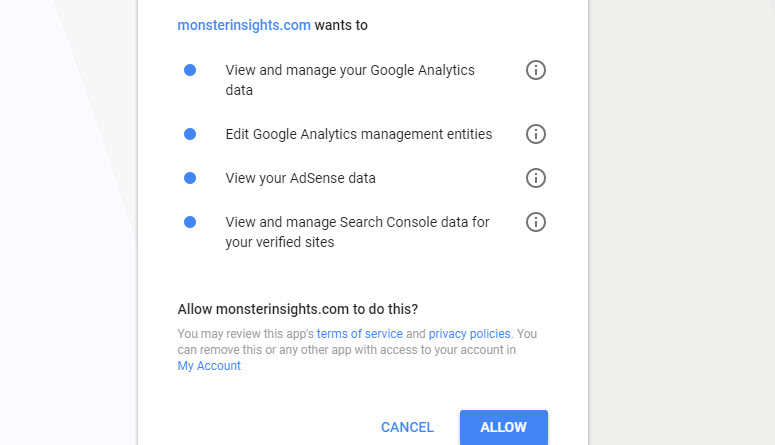
Finally, select the correct website profile for your site and click Complete Authentication.
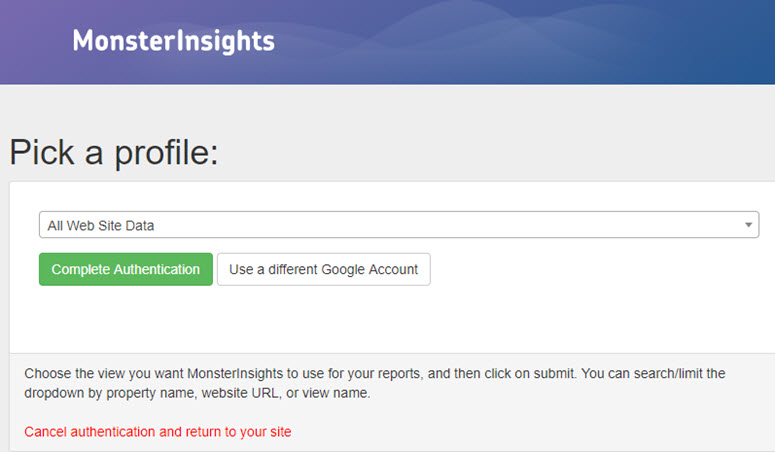
After authentication, you can easily discover how your website is doing by visiting Insights » Reports.
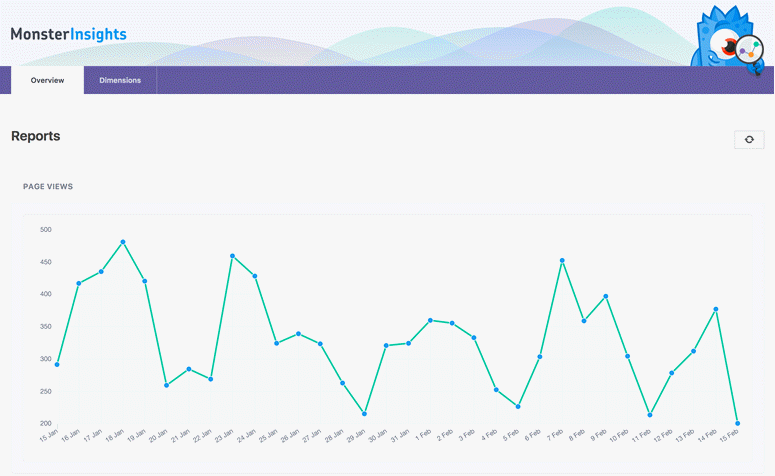
Get started with MonsterInsights today to easily set up Google Analytics on your site.
Want to start with the free version instead? Try MonsterInsights Lite。
6.3。 How to Improve Your Website’s SEO
Want to attract a targeted audience to your website? The best way to attract targeted visitors is to drive more search engine traffic, also known as organic traffic, by improving your website’s SEO.
According to OptinMonster, SEO is the practice of increasing your website traffic by getting your web pages to rank higher in search engine results. Visitors who arrive at your site via search engines are called organic traffic.
SEO can get technical and complicated, but, thanks to free SEO plugins, it has gotten quite easy to improve your WordPress SEO, even for beginners.
While you can find tons of different SEO plugins out there, we use and recommend Yoast SEO。 It’s the most popular SEO plugin for WordPress (for good reason!).
With Yoast SEO, you can easily add meta tags and titles to your WordPress blog posts and pages. It also forces you to choose a focus keyword for your blog posts and pages to ensure you’re using the keyword appropriately on that page.
In your WordPress dashboard, go to Plugins » Add New. Search for Yoast in the search bar in the top right-hand corner. The Yoast SEO plugin will now have appeared on your page. Click Install, and then Activate.
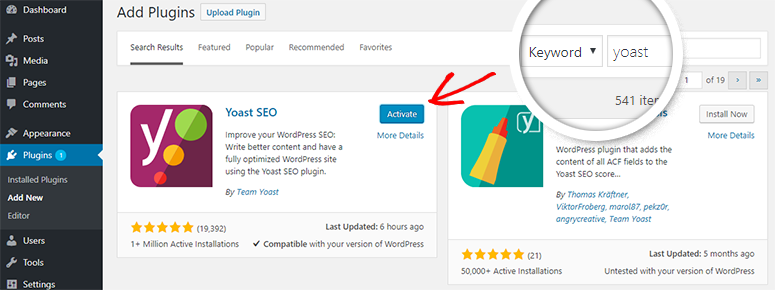
On your WordPress dashboard, you can now find the SEO menu in the left-hand taskbar. Simply click on it. If the plugin detects any SEO errors, you can fix them by following the suggestions provided.
Setting up Yoast SEO is simple when using the configuration wizard. Simply click on the configuration wizard to get started.
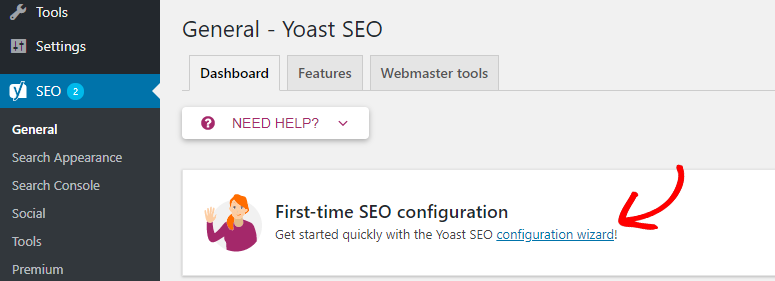
In the first step, you’ll be asked whether you want to configure Yoast SEO yourself or hire an expert to do it for you. Select CONFIGURE YOAST SEO to do it yourself.
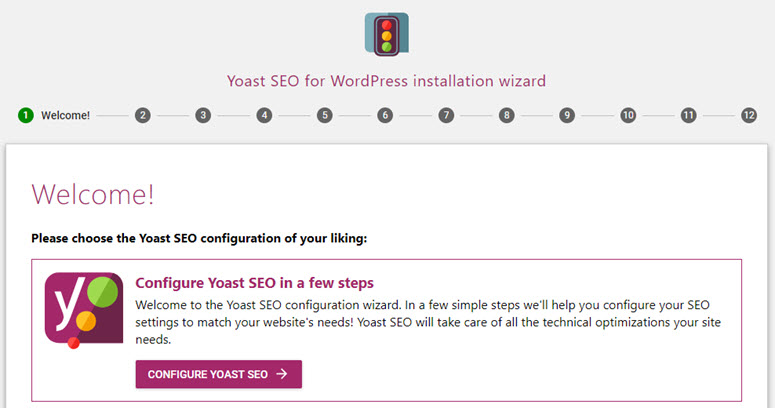
In the next step, you’ll be asked whether your site is ready to be indexed. You can choose option A. Then, click Next.
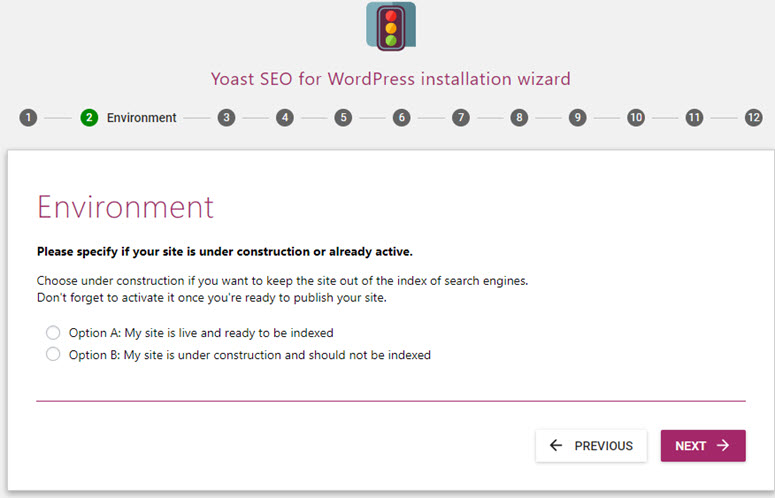
You can find a lot of different website types in the list. Be sure to choose the right type, and then, click Next.
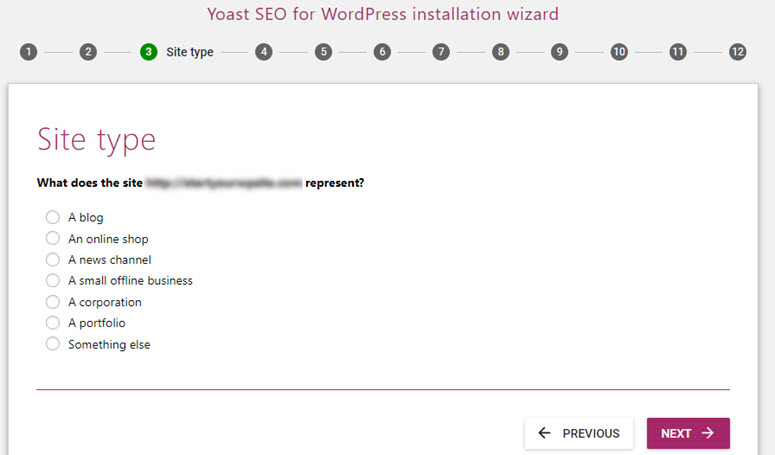
For Google’s knowledge graph card, you’ll be asked whether the site is run by a person or a brand. If Person is selected, you’ll have to specify the name of the person. If Company is selected, you’ll have to add the logo as well. Then, click Next.
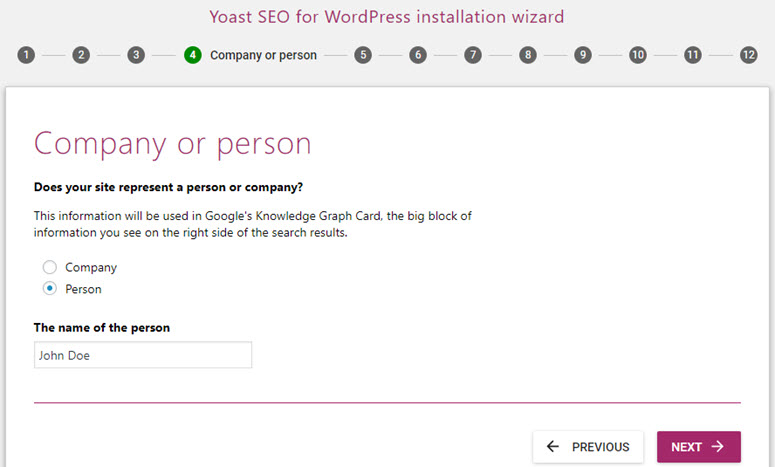
You can now enter your social media profile URL in its appropriate field. Then, click Next.
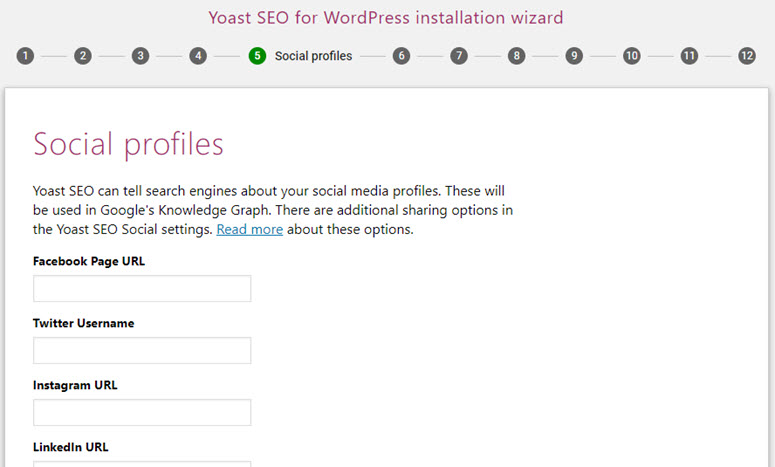
In the Search engine visibility step, you don’t have to change the default settings because they’re set up to index your posts and pages. Simply click Next.
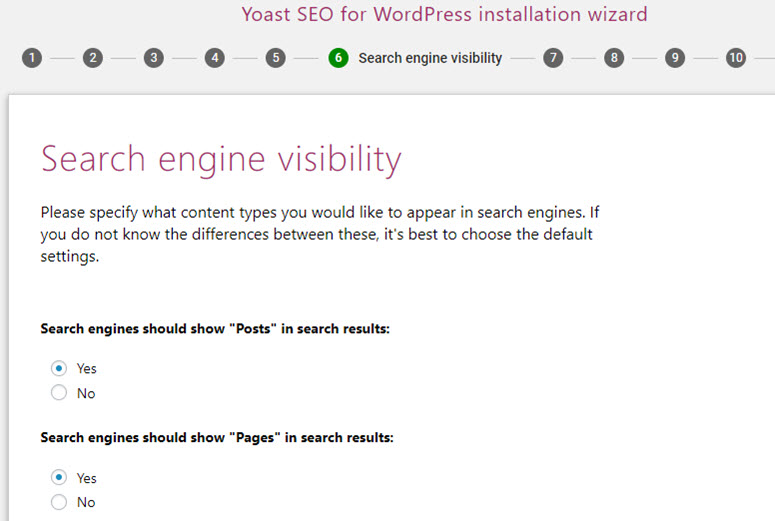
Author archives might create duplicate content issues for search engines. To prevent this, you can disable it if your blog doesn’t have multiple authors.
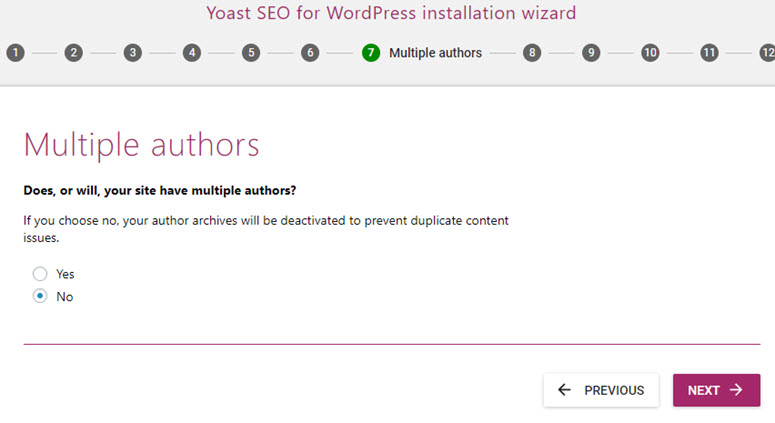
Next, you’ll be prompted to connect your website to Google Search Console, which is a free tool that gives you detailed insights into how your blog content is being perceived by Google.
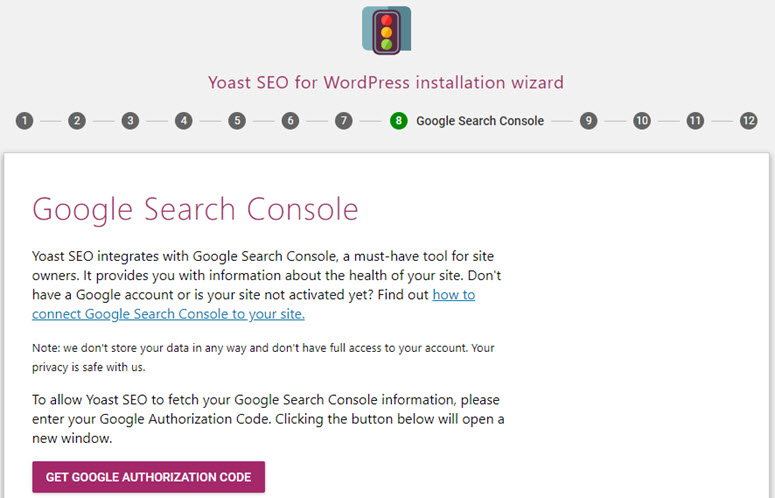
Next, you can set up the title for your blog, and then, click Next.
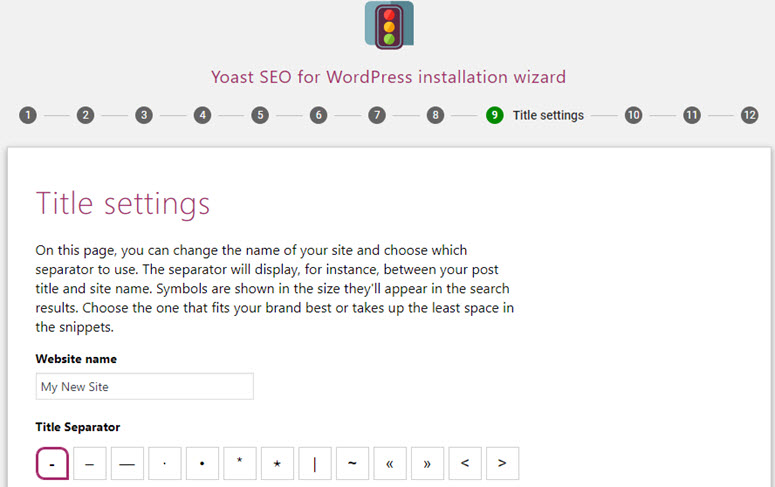
You can now exit the configuration wizard because other steps are created for promotional purposes only (such as signing up for Yoast’s newsletter).
Get started with Yoast SEO today to improve your blog’s SEO.
Want to start with the free version instead? Try the free Yoast SEO。
If you’re looking for some more recommended plugins for your website, then take a look below:
- Build contact forms with WPForms – 临 | 自由
- Connect your site with Google Analytics using MonsterInsights – 临 | 自由
- Improve your SEO with Yoast SEO – 临 | 自由
- Add an extra layer of security with Sucuri
- Create regular backups with Updraft Plus – 临 | 自由
- Improve WordPress performance with W3 Total Cache
- Prevent spam comments with Akismet – 临 | 自由
- Grow your subscribers and sales with OptinMonster
↑ Go back to Table of Contents
« Previous: Chapter 5 – Configuring Your Website Settings
Chapter 7: Add Enhanced Features to Your Website (Advanced)

Depending on your needs, you might want to add enhanced features to your website. WordPress is extremely extensible, so all you have to do is to find the right plugin that allows you to add enhanced capabilities to your site without having to create it yourself or hire a developer.
Let’s take a look at how easy it is to add enhanced features to your WordPress website.
- Start blogging
- Add an eCommerce storefront
- Add a discussion board/forum
- Make your website available in multiple languages
7.1. Start Blogging
Adding a blog to your website is a great way to drive traffic to your new website and make it easier for users to discover you online. So, you’ll want to start a blog on your new WordPress website.
First, decide what you’ll blog about. The blog posts you write should match the goal of your website. For example, if you’re starting a small business website for your landscaping company, you could blog about lawn care tips for your customers. If you’re creating an online store, you could blog about gift recommendations to promote your products. Of course, if you’re starting a lifestyle blog, you’ll want to write about lifestyle topics.
Step 1: Create a Blog Post
To create your first blog post, in the WordPress dashboard, click on Posts, and then Add New. This will take you to the WordPress editor where you can start writing your post. Simply type in the title of your blog post and start typing the body of the post underneath it.
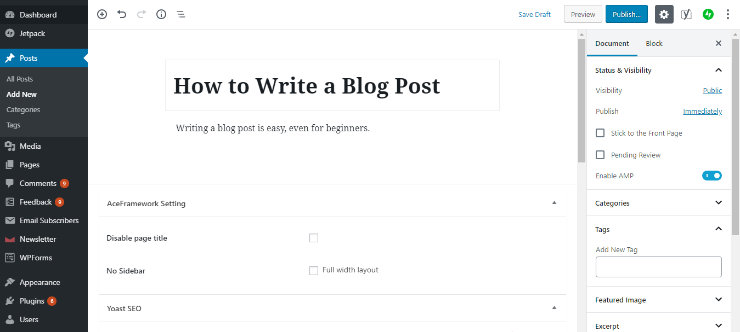
In your blog posts, you can add blocks such as images, headings, audio, gallery, quotes, list, video, and more. To add a new block, click on the (+) icon in the top left corner. The most common blocks will appear first. Simply click the block you want to add within your blog post.
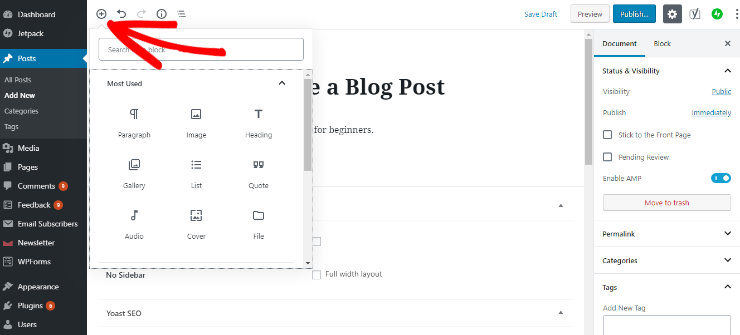
Step 2: Add Categories and Tags
When creating a blog post you’ll also want to add categories and tags. Categories and tags will keep the blog content on your website organized and make it easy for your site visitors to find what they’re looking for.
Categories are meant to be broad groupings. For instance, on a recipe blog, you might have broad categories such as Breakfast Recipes, Lunch Recipes, Dinner Recipes, and Dessert Recipes.
To add a category to your blog post, go to the gear panel on the right hand side. Under the Categories section, click Add New Category.
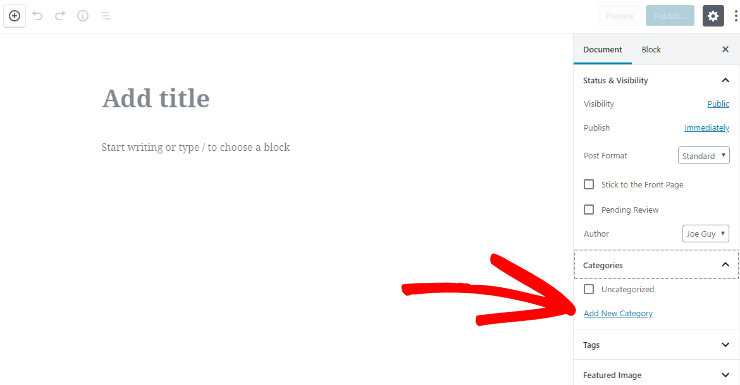
Name the category in the text field provided and click the Add New Category button underneath. Once your new category is created, it will appear with a blue checked box.
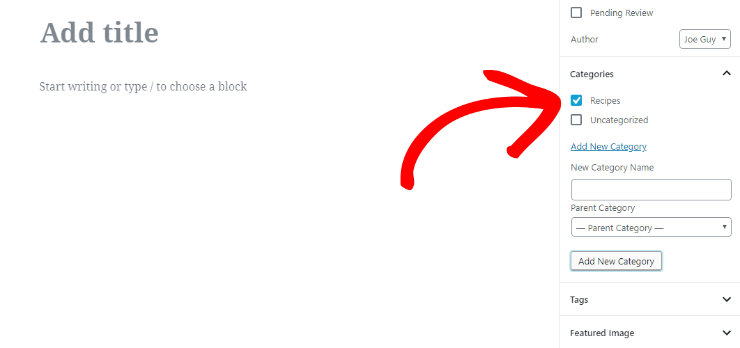
You can add as many categories and subcategories as you want.
Tags are meant to describe specific details of your post and can be used to micro-categorize your posts. For instance, a blog post for a spaghetti recipe could be in the category “Dinner Recipes” and include tags like “spaghetti recipe” and “homemade pasta”.
To add a tag, go to the panel on the right side of the WordPress editor. Under the Tags section, type in your tag and press enter to add a tag to your post.
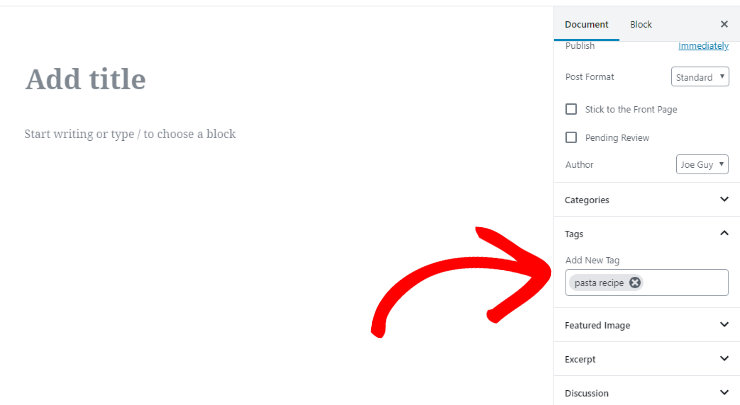
Once you’re finished writing your blog post and adding categories and tags, click the blue Publish button in the top right hand corner to make your blog post live on your website.
7.2。 Add an eCommerce Storefront
The eCommerce industry is booming and the future of retail is eCommerce. With WordPress, adding an eCommerce storefront to your site is as easy as installing a plugin.
While you can find dozens of eCommerce plugins, WooCommerce beats the pants off all the competition and stays ahead of the curve with its unique features and ease of use.
WooCommerce is the best eCommerce plugin for WordPress. It lets you easily integrate a storefront with your existing website and allows you to accept payments via PayPal. That said, it’s in your best interest to make sure that your WordPress theme is compatible with WooCommerce.
A few features of WooCommerce are:
- Allows you to easily sell physical or digital goods on your website.
- Easily add more payment gateways with addon plugins.
- Support tons of free and premium addon plugins to enhance your storefront.
- If you need to hire developers to add custom features to your site, it’s easy to find them because WooCommerce is the most popular eCommerce solution for WordPress.
Read the complete WooCommerce review for more information.
Looking to integrate an online storefront with your site? Get started with WooCommerce today。
7.3。 Add a Discussion Board/Forum
Adding a discussion board or forum inside your WordPress-powered site is helpful to grow an engaged community. WordPress makes it easy to provide threaded discussion forums where your users can mingle and collaboratively work with a larger public.
bbPress is one of the best WordPress forums plugins, and is created by the same folks behind WordPress.org.
Some of the cool benefits of powering your website with bbPress forums are:
- Hundreds of addon plugins are available that let you easily enhance your forum.
- Makes it easy to get your forums up and running with just a few clicks.
- Comes with a full set of features including extended profiles, group forums, notifications and activity logging, etc.
Read the complete bbPress review。
Looking to integrate a discussion board/forum with your site? Get started with bbPress today。
7.4. Make Your Website Available in Multiple Languages
Want to reach a wider audience by making your website available in multiple languages? Creating a multilingual website and reaching a global audience is easy with WordPress thanks to the different types of translation plugins available in the market.
With WordPress, you can find tons of different plugins that make it simple to create a multilingual website.
While some plugins focus on ease of use and enable you to easily create and manage your multilingual website, other plugins help you deliver automated translation based on users’ preferences. You can also find plugins that help you
connect with professional translators from within your WordPress dashboard.
To create a multilingual website with ease, we recommend using Polylang, one of the most popular WordPress translation plugins in the plugin directory.
With Polylang, you can use as many languages as you want, which is search engine friendly and is also compatible with the WooCommerce plugin.
Get started with Polylang today。
↑ Go back to Table of Contents
« Previous: Chapter 6 – Essential WordPress Plugins & Tutorials
Chapter 8: Promote and Grow Your Website

Before you start investing time and resources in promoting your site, it’s worth taking a moment to examine whether your website provides value to your visitors. No matter how much you spend on website promotion, your visitors won’t stick around unless it provides some kind of value.
For example, if your site is an online store, then you might want to publish useful videos demonstrating your products and how to use them. You can also offer huge discounts for first-time customers and bundled purchases.
Similarly, if you have a content website, then you might create pillar content that ranks well on Google so that it attracts new visitors and backlinks.
Once you’ve built a system on your website, like pillar content that provides some kind of value to your visitors, you can start investing your time and resources to drive traffic.
Keep in mind that without these systems your visitors won’t stick around, making your marketing efforts less effective.
8.1. Drive Traffic to Your Website
Traffic is the life of every website and, without it, your website will be worthless.
A few different ways to drive traffic to your blog are:
- Guest posting: Publish your guest articles in a popular blog and include a backlink to your site. Aside from driving traffic, it helps you demonstrate your expertise in your niche and establish yourself as an authority.
- Email outreach: Create a list of bloggers in your niche circles. Start an email outreach campaign to reach out to the bloggers and request them to provide a backlink to your site. With the right strategies, this tactic is effective in building backlinks and driving traffic.
- Search engine optimization (SEO): SEO enables you to grow your website traffic by getting your blog posts to rank higher in search engines. With onsite and offsite SEO tactics, you can drive more targeted organic traffic to your site.
- Social media: Encourage your readers to share your blog posts to social media. This can help you drive social media users to your site.
8.2. More Ways to Promote Your Website
Promotional strategies aren’t limited to driving instant traffic. If you’re only focused on short-term gains, chances are you’ll fall behind soon.
Wondering what promotional strategies you can rely upon for the long-term? Let’s take a look at some of them below.
1. Start an Email List:
One of the best ways to keep your visitors close with your brand or website is by creating an email list. In fact, it’s been found that 70% of first-time visitors will never return to your site once they leave. However, with an email list, you can build a connection with your visitors by regularly updating them on what’s been happening around your website and, ultimately, bring them back to your site.
You can sign up for a list building tool 喜欢 Constant Contact, AWeber 要么 MailChimp and start growing your email list by adding a signup box to your blog.
2. Exponentially Grow Your List:
Most default signup forms you create from email marketing services are boring. This makes lead generation less effective, which also significantly slows down the growth of your email list.
同 OptinMonster, you can create beautiful optin forms with ease that are proven to drive more signups. It also comes with dozens of targeting options, so you can display the form to the right user in the right location of your site at the right time without frustrating them.
OptinMonster also helps you reduce cart abandonment with time-sensitive behavior based offers, which can be super helpful for online retailers.
3. Acquire Leads and Customers:
Investing in online ads is one of the best ways to acquire visitors, leads, and customers. Unlike traditional ads, online ads help you laser target your potential customers. Because of this, you can spend your advertising budget efficiently and drive more revenue through it.
Facebook ads: Facebook advertising is probably the easiest, yet effective enough to drive your targeted customers to your websites. It comes with tons of targeting options that enable you to display your ads to the right segment of Facebook audiences that are more likely to become your customers.
Google AdWords: When done right, Google AdWords is the most reliable advertising method that helps you generate more leads and customers for your online business. You can place your ads just above Google search results to attract visitors to your site and sell your products.
↑ Go back to Table of Contents
« Previous: Chapter 7 – Add Enhanced Features to Your Website
Chapter 9: Before-Launch Checklist
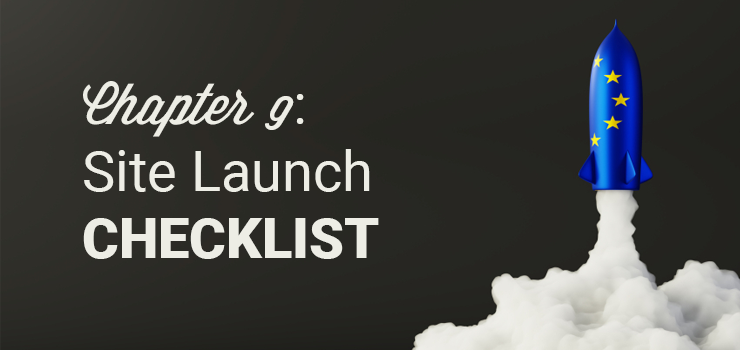
Making a website is serious business. Putting out your website for the world to see before it’s ready can impact your reputation and cost you future customers. So, before you launch your website, you need to make sure you’ve got everything in order.
To prevent you from launching your website before it’s ready, here’s a before-launch checklist you can follow. Check out the list below and before you make your website live, make sure you can check off each step.
- Build Your Website – Build your website and make sure you have all the important pages such as a home page, about, contact page, etc.
- Prep with a Coming Soon Page – Get your audience excited about your website before it’s even launched by adding a coming soon page to your site. You can easily do this using a plugin like SeedProd。
- Check for Errors – Check your website for little errors such as spelling mistakes. Make sure it’s easy to read by checking fonts and colors.
- Check Images – Check to make sure your images appear on your site, they’re optimized, and that they have alt text.
- Test Links – Test all of the links on your website to make sure they work and lead to the correct place. This includes your site navigation as well as any button links or links within content.
- Configure WordPress Settings – Configure WordPress settings like search engine visibility, permalink structure, comments and notifications, and timezone.
- Install Analytics – Create a Google Analytics account and use MonsterInsights to track your website data. Test to make sure it’s tracking accurately before launching your site.
- Test for Mobile – Make sure your website is mobile-friendly.
- Check Browser Compatibility – Make sure your site appears properly in all different browser types using a tool like BrowserShots。
- Test the Performance of Your Site – Test the speed and performance of your website to make sure it’s optimized for users. You can use our Free Website Speed Test Tool to test your site and get suggestions for improvements.
- Optimize Your Site for SEO – Install a plugin like Yoast SEO in order to optimize your website for SEO.
- Secure Your Site – Install a security plugin for your site like Sucuri. Be sure to use a backup plugin like Updraft Plus and prevent spam comments with Akismet.
After you’ve checked off each step in this before-launch checklist, it’s time to make your website live!
↑ Go back to Table of Contents
« Previous: Chapter 8 – Promote and Grow Your Website
Chapter 10: Useful Resources and FAQs

To be able to run a website and grow it on a WordPress platform, mastering and honing your WordPress skills are essential. While you don’t have to learn any programming languages, you should be able to fix some common technical issues yourself. It’s recommended to follow some of the top WordPress resources on the web.
Some of the best free WordPress resources you’ll find helpful are:
- IsItWP: At IsItWP, we regularly publish WordPress tutorials, WordPress theme and plugin reviews, product roundups, WordPress deals, and a lot more.
- WPBeginner: WPBeginner is the largest free WordPress resource on the web for WordPress beginners. On a regular basis, they publish useful WordPress tutorials, videos, deals for WordPress products, and a lot more.
- WPForms blog: Want to grow your online business using the WordPress platform? Then you need to follow the WPForms blog where can discover best practices and WordPress recommendations to build any types of WordPress online forms.
- MonsterInsights blog: The MonsterInsights’ blog is an excellent resource you can follow to get a handle on Google Analytics best practices and tips.
Having helped thousands of users start websites, we’ve found that people often ask the same questions again and again. This is why we’ve compiled a list of most frequently asked questions, so you can easily get your website up and running.
Can I create a website without WordPress?
Yes, there are a lot of different website builders out there that help you build a website. However, we always recommend you to start a website with WordPress because most free website builders display their ads on your free website, making it look unprofessional. They also don’t even allow you to choose a custom domain name for your site unless you subscribe to a premium plan. Also, if you violate any of their terms, they can shut down your website without warning.
On the other hand, with WordPress, you get full freedom over your site. Plus, you can add any additional functionalities without hiring a developer (like contact forms, an online store, etc).
Can I make a website on WordPress with no coding?
With WordPress, anyone can create a website without any technical knowledge. You can easily choose from tons of different WordPress themes that help you change your websites’ appearance. WordPress also has several drag & drop page builders 喜欢 Beaver Builder 和 Divi that makes it super easy for you to create completely custom websites.
What’s the difference between WordPress.com and WordPress.org (self-hosted WordPress)?
WordPress.com is a free blogging platform that lets you kick start a website with ease. However, it comes with a lot of restrictions such as limited theme availability and limited storage space. Plus, the free platform doesn’t allow you to monetize your website with third-party vendors (like Google AdSense).
WordPress.org, also known as self-hosted WordPress, requires you to own a domain name and a hosting account to run a site. With a self-hosted platform, you get full control over your site, can monetize it the way you want, and it provides unlimited theme and customization options as well as unlimited storage space depending on your hosting provider.
How much does it cost to start a website?
To start a website on self-hosted WordPress, you’ll have to purchase a domain name for $14.99 per year and a hosting account, which costs around $7.99 per month. Altogether, starting a site will cost as low as $110.87 annually.
You can find thousands of free themes and plugins for your site. However, if you prefer premium themes and plugins, the running cost of your website may increase.
How to make a website mobile responsive?
Choosing a responsive theme for your website is the easiest way to make your website mobile responsive so that it works on any devices including desktops, mobile phones, and tablets.
How to make a website Google searchable?
If you want your potential users to discover your site on Google, then you’ll need to improve your SEO (search engine optimization). SEO is the practice of increasing your website traffic from search engines by getting your web pages to rank higher in search engine results.
Can I start a site anonymously?
If you want to publicize a site but remain anonymous, then make sure to protect your domain with WHOIS privacy turned on. For anonymous sites, people usually use a pseudonym/nickname to write under. You can even create a unique email just for managing the site.
How do websites make money?
There are a lot of different ways to monetize your website and make money through it. Some of them are:
- Advertising: Sell ad spaces to potential advertisers directly or through a third-party vendor like Google AdSense.
- Affiliate marketing: Promote products on your website and start generating revenue when your visitors purchase products through your affiliate links.
- Product sales: Add a storefront to your website and start selling your products to your site visitors.
- Sell services: Offer a service to your clients and generate revenue through it.
Can I add a blog to my website?
With WordPress, adding a blog to your website is easy. All you have to do is to create articles by navigating to Posts » Add New, and publish them by clicking the Publish button.
In addition, make sure to add a link to your blog in your navigation menu so your visitors can easily discover it.
Can a website be managed by many users?
是。 WordPress comes with 5 default user roles by which you can manage the roles and permissions for every user of your site: administrator, editor, author, contributor, and subscriber.
What are categories and tags in WordPress?
The content of your WordPress blog is organized by categories and tags.
Categories are basically a broad grouping of your blog posts. Think of it as general topics you cover or a table of contents for your blog. Since categories are hierarchical, you can have as many subcategories as you like.
Tags are meant to describe specific details of your post. They can be used to micro-categorize your content, and they’re not hierarchical. Think of these as the index part of a book.
How can I learn more about WordPress terminologies?
Refer to this WordPress Glossary Terms for Beginners whenever you’re puzzled by strange WordPress terms or abbreviations.
How do I make my website faster?
Choosing a reliable web host like Bluehost is one of the recommended ways to make your website faster. Some other methods are:
- Reduce the images you use on a single page or lazy load them if you want to use a lot of them in a single page.
- Boost your site’s performance using a cache plugin, like W3 Total Cache。
- Use a Content Delivery Network (CDN)。
How do I make my website secure?
To make your website secured, it’s advised to back up it on a regular basis and use a security plugin, like Sucuri so you can scan it and fix any issues as they’re found.
↑ Go back to Table of Contents
« Previous: Chapter 9 – Before-Launch Checklist
We hope this guide helped you learn how to start a WordPress website without hiring a developer.
If you enjoyed this article, check out our article on how to create an online store。
这篇文章 How to Make a Website in 2019- Step by Step (with Pictures) appeared first on IsItWP – WordPress技术查找工具。


